Edie Melson's Blog, page 353
January 28, 2016
Obedience
Edie here. I want to make sure you know that Henry's latest book, Riverbed Justice, is now available. Read more about it at the end of this post. Also, today is Henry's birthday. Be sure to leave him lots of well wishes. And remember, the best gift we can give a writer is a review!
Obedience
by Henry McLaughlin @RiverBendSagas
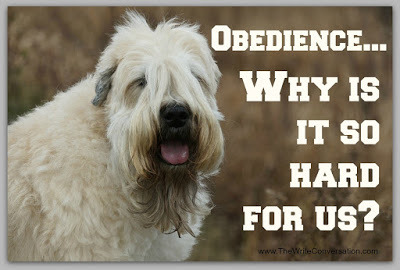 It is not what we do that matters, but what a sovereign God chooses to do through us. God doesn't want our success; He wants us. He doesn't demand our achievements; He demands our obedience. ~ Charles Colson as quoted in Mike Huckabee's God Fruits
It is not what we do that matters, but what a sovereign God chooses to do through us. God doesn't want our success; He wants us. He doesn't demand our achievements; He demands our obedience. ~ Charles Colson as quoted in Mike Huckabee's God Fruits
Why is it hard sometimes to give God what he wants most from us—our obedience?It’s easy to obey in some things.Yes, Lord, I’ll go to church every Sunday. And I’ll volunteer in the nursery or the parking lot, wherever they need me.Yes, Lord, I’ll spend time each day reading the Bible and praying.Yes, Lord, I’ll bless the food before every meal.
 There are times when it's hard to obey.But then there are times when it’s hard to obey.Tithe? I’m not sure about this tithing thing, Lord. Are you sure it’s scriptural?Go with the church into a town devastated by a tornado or hurricane. I don’t know, Lord. There’s no electricity or working toilets. Can’t I just give a little extra instead?Buy a meal for a homeless person? I can do that, Lord.Sit with them, listen to them, minister to them, pray for them. I don’t know Lord. I’ve got to get the kids to Little League.Give up my job and move to the mission field? Are you nuts, Lord? No offense.Leave my family and move to another part of the country to serve in a ministry? That’s asking a lot, Lord.Be a writer? Get up early. Stay up late. Type words into a computer that nobody seems interested in reading. Send query after query and receive rejection after rejection. Have critique partners give me a deer-in-the-headlights look when my beautiful writing leaves them confused and questioning if English is my primary language. Walk in a world with it’s own jargon (show, don’t tell; point of view; three act structure), a world that sometimes seems like a granola festival—full of fruits, nuts, and flakes. To put my ego out there to be flayed, fileted and fried.I’ve learned—okay, I’m still learning every day—to be obedient in the little things. This will develop the strength and faith in him to be faithful in the big things.
There are times when it's hard to obey.But then there are times when it’s hard to obey.Tithe? I’m not sure about this tithing thing, Lord. Are you sure it’s scriptural?Go with the church into a town devastated by a tornado or hurricane. I don’t know, Lord. There’s no electricity or working toilets. Can’t I just give a little extra instead?Buy a meal for a homeless person? I can do that, Lord.Sit with them, listen to them, minister to them, pray for them. I don’t know Lord. I’ve got to get the kids to Little League.Give up my job and move to the mission field? Are you nuts, Lord? No offense.Leave my family and move to another part of the country to serve in a ministry? That’s asking a lot, Lord.Be a writer? Get up early. Stay up late. Type words into a computer that nobody seems interested in reading. Send query after query and receive rejection after rejection. Have critique partners give me a deer-in-the-headlights look when my beautiful writing leaves them confused and questioning if English is my primary language. Walk in a world with it’s own jargon (show, don’t tell; point of view; three act structure), a world that sometimes seems like a granola festival—full of fruits, nuts, and flakes. To put my ego out there to be flayed, fileted and fried.I’ve learned—okay, I’m still learning every day—to be obedient in the little things. This will develop the strength and faith in him to be faithful in the big things.
Being obedient to His call to write is a big thing. It requires humbling myself, it requires sacrifice of time and finances, it requires risking, putting aside comfort and pride, and doing what He puts on my heart.
And it’s worth it. For the reward. Not the financial or ego rewards, although they are nice. I’m talking about the reward of standing before Him and hearing Him say, “Well done, good and faithful servant.”
Has God ever asked you to do something and you thought He’d lost His marbles? How did you handle it?
Be sure to share your thoughts in the comments section below.
TWEETABLE Being obedient to His call to write is a big things - @RiverbendSagas on @EdieMelson (Click to Tweet)
Riverbend Justice
 Riverbend Justice is the exciting sequel to Henry McLaughlin’s award winning novel, Journey to Riverbend.
Riverbend Justice is the exciting sequel to Henry McLaughlin’s award winning novel, Journey to Riverbend.
In this second book of the Riverbend Sagas, Michael Archer, wracked by guilt and failure over having killed once again, embarks on a mission to clear the name of Ben Carstairs, a man wrongly executed for murder. He tried to do this once before and failed. If not for the wish of Ben’s dying father, Michael would have gladly disappeared into his old life and pulled the cork in after him.
His journey brings him back to dear friends who had supported him when he made his way from the depths of a life headed for hell to one where he dared dream of possible happiness.
Can he ever recover that dream? Is he even worthy of it? Is he worthy of Rachel Stone, the woman he fell in love with in Riverbend?
With the help of old friends and new, he seeks to unravel the mystery. Only now, records are missing, potential witnesses can’t be found, and the forces seeking to keep the secret are more determined than ever to stop him. Another murder takes place, possible suspects disappear, and danger looms as ominous strangers threaten.
Undeterred, he continues. When he is beaten and shot, and an innocent young girl is taken hostage, and his beloved Rachel Stone is wounded, he puts aside physical pain and his own fears to seek the killers.
In finding them, he reveals corruption reaching to the highest levels of the town. Levels more determined than ever to stop him. To bring the guilty to justice and to save those he holds most dear, he faces a life or death struggle with powerful enemies. Revealing the truth may cost him more than he is willing to pay.
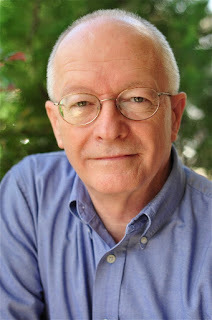 Henry’s debut novel, Journey to Riverbend, won the 2009 Operation First Novel contest.
Henry’s debut novel, Journey to Riverbend, won the 2009 Operation First Novel contest.
He serves as Associate Director of North Texas Christian Writers.
Henry edits novels, leads critique groups, and teaches at conferences and workshops. He enjoys mentoring and coaching individual writers.
Connect with Henry on his blog, Twitter and Facebook.
Obedience
by Henry McLaughlin @RiverBendSagas
 It is not what we do that matters, but what a sovereign God chooses to do through us. God doesn't want our success; He wants us. He doesn't demand our achievements; He demands our obedience. ~ Charles Colson as quoted in Mike Huckabee's God Fruits
It is not what we do that matters, but what a sovereign God chooses to do through us. God doesn't want our success; He wants us. He doesn't demand our achievements; He demands our obedience. ~ Charles Colson as quoted in Mike Huckabee's God FruitsWhy is it hard sometimes to give God what he wants most from us—our obedience?It’s easy to obey in some things.Yes, Lord, I’ll go to church every Sunday. And I’ll volunteer in the nursery or the parking lot, wherever they need me.Yes, Lord, I’ll spend time each day reading the Bible and praying.Yes, Lord, I’ll bless the food before every meal.
 There are times when it's hard to obey.But then there are times when it’s hard to obey.Tithe? I’m not sure about this tithing thing, Lord. Are you sure it’s scriptural?Go with the church into a town devastated by a tornado or hurricane. I don’t know, Lord. There’s no electricity or working toilets. Can’t I just give a little extra instead?Buy a meal for a homeless person? I can do that, Lord.Sit with them, listen to them, minister to them, pray for them. I don’t know Lord. I’ve got to get the kids to Little League.Give up my job and move to the mission field? Are you nuts, Lord? No offense.Leave my family and move to another part of the country to serve in a ministry? That’s asking a lot, Lord.Be a writer? Get up early. Stay up late. Type words into a computer that nobody seems interested in reading. Send query after query and receive rejection after rejection. Have critique partners give me a deer-in-the-headlights look when my beautiful writing leaves them confused and questioning if English is my primary language. Walk in a world with it’s own jargon (show, don’t tell; point of view; three act structure), a world that sometimes seems like a granola festival—full of fruits, nuts, and flakes. To put my ego out there to be flayed, fileted and fried.I’ve learned—okay, I’m still learning every day—to be obedient in the little things. This will develop the strength and faith in him to be faithful in the big things.
There are times when it's hard to obey.But then there are times when it’s hard to obey.Tithe? I’m not sure about this tithing thing, Lord. Are you sure it’s scriptural?Go with the church into a town devastated by a tornado or hurricane. I don’t know, Lord. There’s no electricity or working toilets. Can’t I just give a little extra instead?Buy a meal for a homeless person? I can do that, Lord.Sit with them, listen to them, minister to them, pray for them. I don’t know Lord. I’ve got to get the kids to Little League.Give up my job and move to the mission field? Are you nuts, Lord? No offense.Leave my family and move to another part of the country to serve in a ministry? That’s asking a lot, Lord.Be a writer? Get up early. Stay up late. Type words into a computer that nobody seems interested in reading. Send query after query and receive rejection after rejection. Have critique partners give me a deer-in-the-headlights look when my beautiful writing leaves them confused and questioning if English is my primary language. Walk in a world with it’s own jargon (show, don’t tell; point of view; three act structure), a world that sometimes seems like a granola festival—full of fruits, nuts, and flakes. To put my ego out there to be flayed, fileted and fried.I’ve learned—okay, I’m still learning every day—to be obedient in the little things. This will develop the strength and faith in him to be faithful in the big things.Being obedient to His call to write is a big thing. It requires humbling myself, it requires sacrifice of time and finances, it requires risking, putting aside comfort and pride, and doing what He puts on my heart.
And it’s worth it. For the reward. Not the financial or ego rewards, although they are nice. I’m talking about the reward of standing before Him and hearing Him say, “Well done, good and faithful servant.”
Has God ever asked you to do something and you thought He’d lost His marbles? How did you handle it?
Be sure to share your thoughts in the comments section below.
TWEETABLE Being obedient to His call to write is a big things - @RiverbendSagas on @EdieMelson (Click to Tweet)
Riverbend Justice
 Riverbend Justice is the exciting sequel to Henry McLaughlin’s award winning novel, Journey to Riverbend.
Riverbend Justice is the exciting sequel to Henry McLaughlin’s award winning novel, Journey to Riverbend. In this second book of the Riverbend Sagas, Michael Archer, wracked by guilt and failure over having killed once again, embarks on a mission to clear the name of Ben Carstairs, a man wrongly executed for murder. He tried to do this once before and failed. If not for the wish of Ben’s dying father, Michael would have gladly disappeared into his old life and pulled the cork in after him.
His journey brings him back to dear friends who had supported him when he made his way from the depths of a life headed for hell to one where he dared dream of possible happiness.
Can he ever recover that dream? Is he even worthy of it? Is he worthy of Rachel Stone, the woman he fell in love with in Riverbend?
With the help of old friends and new, he seeks to unravel the mystery. Only now, records are missing, potential witnesses can’t be found, and the forces seeking to keep the secret are more determined than ever to stop him. Another murder takes place, possible suspects disappear, and danger looms as ominous strangers threaten.
Undeterred, he continues. When he is beaten and shot, and an innocent young girl is taken hostage, and his beloved Rachel Stone is wounded, he puts aside physical pain and his own fears to seek the killers.
In finding them, he reveals corruption reaching to the highest levels of the town. Levels more determined than ever to stop him. To bring the guilty to justice and to save those he holds most dear, he faces a life or death struggle with powerful enemies. Revealing the truth may cost him more than he is willing to pay.
 Henry’s debut novel, Journey to Riverbend, won the 2009 Operation First Novel contest.
Henry’s debut novel, Journey to Riverbend, won the 2009 Operation First Novel contest. He serves as Associate Director of North Texas Christian Writers.
Henry edits novels, leads critique groups, and teaches at conferences and workshops. He enjoys mentoring and coaching individual writers.
Connect with Henry on his blog, Twitter and Facebook.
Published on January 28, 2016 01:00
January 27, 2016
A Writer’s Publishing Team
by DiAnn Mills @DiAnnMills
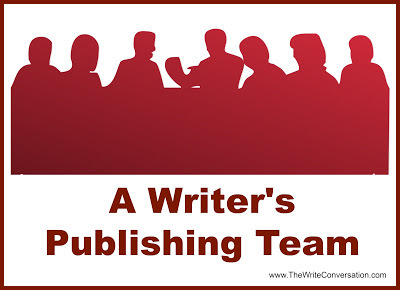 A writer’s passion for a book project isn’t enough. Success depends on her team’s 100% commitment to the project. Writing and publishing are not single-handed ventures.
A writer’s passion for a book project isn’t enough. Success depends on her team’s 100% commitment to the project. Writing and publishing are not single-handed ventures.
It takes a community of specialized people to write, edit, design, market, promote, and sell a story that readers will eagerly purchase, read, and recommend.
Take a look at the overall picture of what goes into placing a story in front of a reader’s eyes.Editor Our first encounter with an editor is the person who acquires our books and shares the same enthusiasm with other colleagues. Several types of editors from overall story to line edits examine plot, character, setting, dialogue etc to ensure a credible and unpredictable story. Editors are a writer’s best friend; they take our challenges and weave them into strengths. Our best book becomes our finest writing project.
Our first encounter with an editor is the person who acquires our books and shares the same enthusiasm with other colleagues. Several types of editors from overall story to line edits examine plot, character, setting, dialogue etc to ensure a credible and unpredictable story. Editors are a writer’s best friend; they take our challenges and weave them into strengths. Our best book becomes our finest writing project.
DesignThis is the art team that takes a long look at our stories to develop a book cover that reflects characters and genre. These extremely talented, behind the scene people peer into the psychological workings of our stories to create an exciting cover.
Marketing and PromotionThe marketing and promotion team are strategists. They use imaginative and innovative means to place our books in venues that remind the reader of its fine attributes. Various Individuals focus on our online presence, social media, ads, book tours, contests and the many other means for publishers and authors to feature their books.
Sales staff These people are a writer’s silent warriors. They use our sales blurbs, cover copy, and a bit about us to entice book store buyers to carry our stories. Their approach is at the grass roots level, and unfortunately they are often unappreciated.
Many gifted people are a part of a writer’s publishing team, but these five groups are the top tiers in the process. We writers are not alone. Whether our publishing plan is through a traditional house or we are independently published, a writer’s publishing team is her most valuable asset.
What is the most challenging part of writing and publishing for you?
TWEETABLEThoughts on a Writer's #Publishing Team - via @DiAnnMills on @EdieMelson (Click to Tweet)
Successful #Publishing takes a team of talented people - @DiAnnMills on @EdieMelson (Click to Tweet)
 DiAnn Mills is a bestselling author who believes her readers should expect an adventure. She combines unforgettable characters with unpredictable plots to create action-packed, suspense-filled novels.
DiAnn Mills is a bestselling author who believes her readers should expect an adventure. She combines unforgettable characters with unpredictable plots to create action-packed, suspense-filled novels.
Her titles have appeared on the CBA and ECPA bestseller lists; won two Christy Awards; and been finalists for the RITA, Daphne Du Maurier, Inspirational Readers’ Choice, and Carol award contests. Library Journal presented her with a Best Books 2014: Genre Fiction award in the Christian Fiction category for Firewall.
DiAnn is a founding board member of the American Christian Fiction Writers; the 2015 president of the Romance Writers of America’s Faith, Hope, & Love chapter; a member of Advanced Writers and Speakers Association, and International Thriller Writers. She speaks to various groups and teaches writing workshops around the country. She and her husband live in sunny Houston, Texas.
DiAnn is very active online and would love to connect with readers on any of the social media platforms listed at www.diannmills.com.
 A writer’s passion for a book project isn’t enough. Success depends on her team’s 100% commitment to the project. Writing and publishing are not single-handed ventures.
A writer’s passion for a book project isn’t enough. Success depends on her team’s 100% commitment to the project. Writing and publishing are not single-handed ventures. It takes a community of specialized people to write, edit, design, market, promote, and sell a story that readers will eagerly purchase, read, and recommend.
Take a look at the overall picture of what goes into placing a story in front of a reader’s eyes.Editor
 Our first encounter with an editor is the person who acquires our books and shares the same enthusiasm with other colleagues. Several types of editors from overall story to line edits examine plot, character, setting, dialogue etc to ensure a credible and unpredictable story. Editors are a writer’s best friend; they take our challenges and weave them into strengths. Our best book becomes our finest writing project.
Our first encounter with an editor is the person who acquires our books and shares the same enthusiasm with other colleagues. Several types of editors from overall story to line edits examine plot, character, setting, dialogue etc to ensure a credible and unpredictable story. Editors are a writer’s best friend; they take our challenges and weave them into strengths. Our best book becomes our finest writing project.DesignThis is the art team that takes a long look at our stories to develop a book cover that reflects characters and genre. These extremely talented, behind the scene people peer into the psychological workings of our stories to create an exciting cover.
Marketing and PromotionThe marketing and promotion team are strategists. They use imaginative and innovative means to place our books in venues that remind the reader of its fine attributes. Various Individuals focus on our online presence, social media, ads, book tours, contests and the many other means for publishers and authors to feature their books.
Sales staff These people are a writer’s silent warriors. They use our sales blurbs, cover copy, and a bit about us to entice book store buyers to carry our stories. Their approach is at the grass roots level, and unfortunately they are often unappreciated.
Many gifted people are a part of a writer’s publishing team, but these five groups are the top tiers in the process. We writers are not alone. Whether our publishing plan is through a traditional house or we are independently published, a writer’s publishing team is her most valuable asset.
What is the most challenging part of writing and publishing for you?
TWEETABLEThoughts on a Writer's #Publishing Team - via @DiAnnMills on @EdieMelson (Click to Tweet)
Successful #Publishing takes a team of talented people - @DiAnnMills on @EdieMelson (Click to Tweet)
 DiAnn Mills is a bestselling author who believes her readers should expect an adventure. She combines unforgettable characters with unpredictable plots to create action-packed, suspense-filled novels.
DiAnn Mills is a bestselling author who believes her readers should expect an adventure. She combines unforgettable characters with unpredictable plots to create action-packed, suspense-filled novels.Her titles have appeared on the CBA and ECPA bestseller lists; won two Christy Awards; and been finalists for the RITA, Daphne Du Maurier, Inspirational Readers’ Choice, and Carol award contests. Library Journal presented her with a Best Books 2014: Genre Fiction award in the Christian Fiction category for Firewall.
DiAnn is a founding board member of the American Christian Fiction Writers; the 2015 president of the Romance Writers of America’s Faith, Hope, & Love chapter; a member of Advanced Writers and Speakers Association, and International Thriller Writers. She speaks to various groups and teaches writing workshops around the country. She and her husband live in sunny Houston, Texas.
DiAnn is very active online and would love to connect with readers on any of the social media platforms listed at www.diannmills.com.
Published on January 27, 2016 01:00
January 26, 2016
The Differences Make a Difference
by Eva Marie Everson @EvaMarieEverson
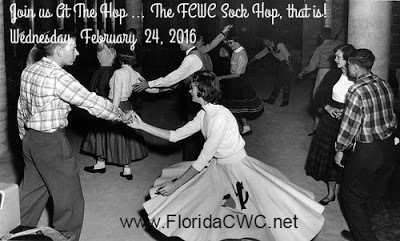 In a month, I will either be on Cloud 9, or absolutely out of my mind. Because in one month, we’ll be on the verge of Florida Christian Writers Conference. And I’m one of the two directors.Egads.
In a month, I will either be on Cloud 9, or absolutely out of my mind. Because in one month, we’ll be on the verge of Florida Christian Writers Conference. And I’m one of the two directors.Egads.
This past weekend, someone who plans to be at the conference as a First Time Conferee told me that one of the “differences” FCWC offers is why she chose our conference this year over others.
And what are those differences, you ask?Not that some of these differences are not offered elsewhere, but here you go: A Book Proposal Studio .Three hours with Kim de Blecourt and Kathy Bruins. Walk in with an idea. Walk out with a printed book proposal you can hand to editors and agents at the conference (and later). A Pitch Studio .You’ve got only seconds to minutes to impress an agent or editor with your idea. Often called “an elevator pitch” because this is the “speech” you’d give an agent or editor if you were in an elevator and only had from the second to the fourth floor to tell them about your work. Walk in with your idea, walk out with your pitch!A Writing/Critique Studio. For conferees who have had all the workshops they can handle in a lifetime. Now, you’re ready to write. To critique and be critiqued. To go back to your room and apply what you’ve learned and then come do it all over again. (Conferees must pre-register for this continuing class.) An award-winning photographer. Malcolm Yawn will be in the house! He’s photographed VIPs and he’ll be at the conference on Friday and Saturday only, taking appointments (and shots!).Brainstorming with the Experts. Four experts—Ramona Richards, Brian Bird, Natalie Gillespie, and Michelle Medlock Adams—will take your work (pre-sent before the conference), make a half-hour appointment with you, and will talk about—brainstorm—your career, your work, your goals … whatever you want to talk about!A Sock Hop.That’s right. You read that correctly. A sock hop … like the old 50s and 60s dance parties. Our theme this year is Dancing on the Head of a Pen, so it’s only fitting. Bring your poodle skirt. Unless you’re a guy … then, don’t.VIP Breakfasts. An extra $5 a day (the money goes toward scholarships). The food is the same, but you’ll dine in a private dining room and you’ll get a special keynote address from 1) Jonathan Clements, or 2) Lucinda Secrest McDowell, or 3) Eddie Jones.
Robert Benson
.He’s an icon in our industry and he’ll be our keynote speaker throughout the conference. I. Can’t. Wait!
An award-winning photographer. Malcolm Yawn will be in the house! He’s photographed VIPs and he’ll be at the conference on Friday and Saturday only, taking appointments (and shots!).Brainstorming with the Experts. Four experts—Ramona Richards, Brian Bird, Natalie Gillespie, and Michelle Medlock Adams—will take your work (pre-sent before the conference), make a half-hour appointment with you, and will talk about—brainstorm—your career, your work, your goals … whatever you want to talk about!A Sock Hop.That’s right. You read that correctly. A sock hop … like the old 50s and 60s dance parties. Our theme this year is Dancing on the Head of a Pen, so it’s only fitting. Bring your poodle skirt. Unless you’re a guy … then, don’t.VIP Breakfasts. An extra $5 a day (the money goes toward scholarships). The food is the same, but you’ll dine in a private dining room and you’ll get a special keynote address from 1) Jonathan Clements, or 2) Lucinda Secrest McDowell, or 3) Eddie Jones.
Robert Benson
.He’s an icon in our industry and he’ll be our keynote speaker throughout the conference. I. Can’t. Wait!
There’s more, of course. Beautiful location. Great food. A “Just Deserts/Desserts Award Program.” Two crazy directors.
What can I say? I’m jazzed. Or maybe on the verge of a nervous breakdown.
One of the two.
Whichever, I hope you’ll consider joining us for FCWC 2016 … for the studios, the photographer, the breakfasts, the dancing, the brainstorming, the keynoter, or to see how I hold up.
Pick one. Pick ‘em all. Y’all come.
TWEETABLE
Attending a Writing Conference like #FCWC can make all the difference - @EvaMarieEverson (Click to Tweet)
 Eva Marie is a multiple award-winning author and speaker. She is one of the original five Orlando Word Weavers critique group members, an international and national group made up of critique chapters. She served as the original president from 2000 to 2007 and is now president of Word Weavers International, Inc. Eva Marie served as a mentor for Jerry B. Jenkins Christian Writers Guild for several years and has taught at a number of writers conferences nationwide. During the 2010-2011 school year, Eva Marie served as an adjunct professor at Taylor University in Upland, Indiana. She describes it as one of the best times she ever had while working. Eva Marie also serves as director of Florida Christian Writers Conference (along with Mark Hancock) and the Education Consultant for SON Studios.
Eva Marie is a multiple award-winning author and speaker. She is one of the original five Orlando Word Weavers critique group members, an international and national group made up of critique chapters. She served as the original president from 2000 to 2007 and is now president of Word Weavers International, Inc. Eva Marie served as a mentor for Jerry B. Jenkins Christian Writers Guild for several years and has taught at a number of writers conferences nationwide. During the 2010-2011 school year, Eva Marie served as an adjunct professor at Taylor University in Upland, Indiana. She describes it as one of the best times she ever had while working. Eva Marie also serves as director of Florida Christian Writers Conference (along with Mark Hancock) and the Education Consultant for SON Studios.
She is both a past and current student at Andersonville Theological Seminary where she plans to receive her Masters in Old Testament Theology sometime before her ninetieth birthday. Eva Marie and her husband make their home in Central Florida where they are owned by one very spoiled dog, a funky chicken, and two hearts-full of grandchildren.
*Carol Award Winner for The Potluck Club ** ICRS Gold Medallion Finalist *** Multiple awards, including 2012 Inspirational Readers Choice Award & Maggie Award (Chasing Sunsets), 2013 Maggie Award & 2013 Christy finalist for Waiting for Sunrise, 2014 AWSA Golden Scroll Award (Slow Moon Rising), 2015 AWSA Golden Scroll Award (The Road to Testament)
****CBA Bestseller List several months running and a finalist for Retailers Choice Awards, 2013
 In a month, I will either be on Cloud 9, or absolutely out of my mind. Because in one month, we’ll be on the verge of Florida Christian Writers Conference. And I’m one of the two directors.Egads.
In a month, I will either be on Cloud 9, or absolutely out of my mind. Because in one month, we’ll be on the verge of Florida Christian Writers Conference. And I’m one of the two directors.Egads.This past weekend, someone who plans to be at the conference as a First Time Conferee told me that one of the “differences” FCWC offers is why she chose our conference this year over others.
And what are those differences, you ask?Not that some of these differences are not offered elsewhere, but here you go: A Book Proposal Studio .Three hours with Kim de Blecourt and Kathy Bruins. Walk in with an idea. Walk out with a printed book proposal you can hand to editors and agents at the conference (and later). A Pitch Studio .You’ve got only seconds to minutes to impress an agent or editor with your idea. Often called “an elevator pitch” because this is the “speech” you’d give an agent or editor if you were in an elevator and only had from the second to the fourth floor to tell them about your work. Walk in with your idea, walk out with your pitch!A Writing/Critique Studio. For conferees who have had all the workshops they can handle in a lifetime. Now, you’re ready to write. To critique and be critiqued. To go back to your room and apply what you’ve learned and then come do it all over again. (Conferees must pre-register for this continuing class.)
 An award-winning photographer. Malcolm Yawn will be in the house! He’s photographed VIPs and he’ll be at the conference on Friday and Saturday only, taking appointments (and shots!).Brainstorming with the Experts. Four experts—Ramona Richards, Brian Bird, Natalie Gillespie, and Michelle Medlock Adams—will take your work (pre-sent before the conference), make a half-hour appointment with you, and will talk about—brainstorm—your career, your work, your goals … whatever you want to talk about!A Sock Hop.That’s right. You read that correctly. A sock hop … like the old 50s and 60s dance parties. Our theme this year is Dancing on the Head of a Pen, so it’s only fitting. Bring your poodle skirt. Unless you’re a guy … then, don’t.VIP Breakfasts. An extra $5 a day (the money goes toward scholarships). The food is the same, but you’ll dine in a private dining room and you’ll get a special keynote address from 1) Jonathan Clements, or 2) Lucinda Secrest McDowell, or 3) Eddie Jones.
Robert Benson
.He’s an icon in our industry and he’ll be our keynote speaker throughout the conference. I. Can’t. Wait!
An award-winning photographer. Malcolm Yawn will be in the house! He’s photographed VIPs and he’ll be at the conference on Friday and Saturday only, taking appointments (and shots!).Brainstorming with the Experts. Four experts—Ramona Richards, Brian Bird, Natalie Gillespie, and Michelle Medlock Adams—will take your work (pre-sent before the conference), make a half-hour appointment with you, and will talk about—brainstorm—your career, your work, your goals … whatever you want to talk about!A Sock Hop.That’s right. You read that correctly. A sock hop … like the old 50s and 60s dance parties. Our theme this year is Dancing on the Head of a Pen, so it’s only fitting. Bring your poodle skirt. Unless you’re a guy … then, don’t.VIP Breakfasts. An extra $5 a day (the money goes toward scholarships). The food is the same, but you’ll dine in a private dining room and you’ll get a special keynote address from 1) Jonathan Clements, or 2) Lucinda Secrest McDowell, or 3) Eddie Jones.
Robert Benson
.He’s an icon in our industry and he’ll be our keynote speaker throughout the conference. I. Can’t. Wait! There’s more, of course. Beautiful location. Great food. A “Just Deserts/Desserts Award Program.” Two crazy directors.
What can I say? I’m jazzed. Or maybe on the verge of a nervous breakdown.
One of the two.
Whichever, I hope you’ll consider joining us for FCWC 2016 … for the studios, the photographer, the breakfasts, the dancing, the brainstorming, the keynoter, or to see how I hold up.
Pick one. Pick ‘em all. Y’all come.
TWEETABLE
Attending a Writing Conference like #FCWC can make all the difference - @EvaMarieEverson (Click to Tweet)
 Eva Marie is a multiple award-winning author and speaker. She is one of the original five Orlando Word Weavers critique group members, an international and national group made up of critique chapters. She served as the original president from 2000 to 2007 and is now president of Word Weavers International, Inc. Eva Marie served as a mentor for Jerry B. Jenkins Christian Writers Guild for several years and has taught at a number of writers conferences nationwide. During the 2010-2011 school year, Eva Marie served as an adjunct professor at Taylor University in Upland, Indiana. She describes it as one of the best times she ever had while working. Eva Marie also serves as director of Florida Christian Writers Conference (along with Mark Hancock) and the Education Consultant for SON Studios.
Eva Marie is a multiple award-winning author and speaker. She is one of the original five Orlando Word Weavers critique group members, an international and national group made up of critique chapters. She served as the original president from 2000 to 2007 and is now president of Word Weavers International, Inc. Eva Marie served as a mentor for Jerry B. Jenkins Christian Writers Guild for several years and has taught at a number of writers conferences nationwide. During the 2010-2011 school year, Eva Marie served as an adjunct professor at Taylor University in Upland, Indiana. She describes it as one of the best times she ever had while working. Eva Marie also serves as director of Florida Christian Writers Conference (along with Mark Hancock) and the Education Consultant for SON Studios.She is both a past and current student at Andersonville Theological Seminary where she plans to receive her Masters in Old Testament Theology sometime before her ninetieth birthday. Eva Marie and her husband make their home in Central Florida where they are owned by one very spoiled dog, a funky chicken, and two hearts-full of grandchildren.
*Carol Award Winner for The Potluck Club ** ICRS Gold Medallion Finalist *** Multiple awards, including 2012 Inspirational Readers Choice Award & Maggie Award (Chasing Sunsets), 2013 Maggie Award & 2013 Christy finalist for Waiting for Sunrise, 2014 AWSA Golden Scroll Award (Slow Moon Rising), 2015 AWSA Golden Scroll Award (The Road to Testament)
****CBA Bestseller List several months running and a finalist for Retailers Choice Awards, 2013
Published on January 26, 2016 01:00
January 25, 2016
A List of 35 Blog Images You Can Take Yourself
by Edie Melson @EdieMelson
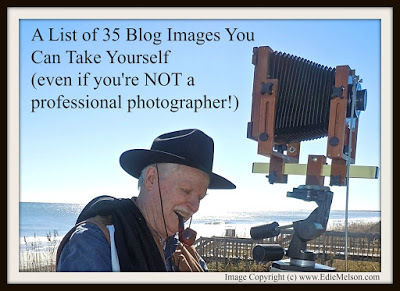 I’ve shared several posts about where to find images for your blog. But one thing I haven’t covered is a list of images you could take with your own camera. I’m always on the lookout for images that I could use to illustrate a post. In my mind, I have a list of things I always need.
I’ve shared several posts about where to find images for your blog. But one thing I haven’t covered is a list of images you could take with your own camera. I’m always on the lookout for images that I could use to illustrate a post. In my mind, I have a list of things I always need.
Today I’m going to write that list out and share it with you.
Before I start though, it’s important to remember that you don’t have to be professional photographer to take your own pictures. You can use a fancy camera, a point and shoot, or even your cell phone. Personally, I use my Nikon point and shoot and my iPhone 6 to take a lot of the images you see on my site.Things to look for that will build your library of blog images:1. A Wall. It can be a brick, stone or any kind of wall. But when we’re talking about obstacles in a blog post, this can be a great visual.
 A Gate.2. A Gate. I have pictures of open gates and closed gates. Again, good images if you’re talking about traveling.
A Gate.2. A Gate. I have pictures of open gates and closed gates. Again, good images if you’re talking about traveling.
3. A Path. I have dozens of path pictures. I have paths in the woods, paved paths, paths that divide, paths that go downhill and paths that go uphill.
4. A Tunnel. This is great if you’re talking about the light at the end of the tunnel. It’s also a good way to illustrate going through tough times.
5. An Obstacle. I have pictures of a trail with a tree blocking the path. I also have pics of detour signs, roadblocks, etc.
6. Traffic Signs. Again, detour signs, Road Closed, Yield, Winding Road, etc.
 Rain.7. Rain. I love pictures of rainy pavement, raindrops, even puddles. These can evoke emotions and illustrate lots of things, like saving for a rainy day.
Rain.7. Rain. I love pictures of rainy pavement, raindrops, even puddles. These can evoke emotions and illustrate lots of things, like saving for a rainy day.
8. Mirrors. For some reason, it’s really hard to find stock images of mirrors. I’ve solved that by taking my own. I just stand off to one side and click away.
9. The Horizon. I love taking horizon pictures. These are really good for illustrating posts about the future.
 A Cross. And I took this picture at
A Cross. And I took this picture at
the Florida Christian Writers Conference
in 2015.10. The Cross. If I see a cool cross, I usually try to snap a picture of it. And I try to find unusual angles, instead of just straight on.
11. Animal Pictures. I look for the opportunity to snap pictures of my dog and cat illustrating emotions. The one here is of my dog Jake napping. I can use this one to illustrate lazy, relaxing, etc.
12. Light Bulb. Anytime you write about finding an idea or having an idea, a light bulb is a great illustration. It can also be used anytime you refer to illumination.
13. Clouds with Sun Rays. These are great to illustrate faith and God.
14. Ripples in Water. These images are great when we write about the effect of something.
15. The Bible. Again, great for messages of faith. I take pictures of the book close, specific passages, and pages that have notes on them.
 Words in the Dictionary.16. Words in the Dictionary. Some times it’s hard to find just the right picture. Instead, look the word up in the dictionary and snap a picture. You can manipulate the picture in www.PicMonkey.comand have a great blog illustration.
Words in the Dictionary.16. Words in the Dictionary. Some times it’s hard to find just the right picture. Instead, look the word up in the dictionary and snap a picture. You can manipulate the picture in www.PicMonkey.comand have a great blog illustration.
17. Computer Keyboard/Keys. Again, good for illustrating posts about writing. You can also take images that focus on a certain key, like Delete, Shift, a Question Mark, etc.
 This is my typewriter with a blank sheet of paper in it.
This is my typewriter with a blank sheet of paper in it.
I added Write in Faith using PicMonkey.18. Typewriter/Typewriter Keys. This is great for us when we write about writing. You can even put a piece of blank paper in the typewriter and use a site like PicMonkey to add words to the paper.
19. Luggage. This is great when we’re talking about taking more than we can handle, carrying baggage, etc.
20. Exit/Do Not Enter Signs. These are great to illustrate posts that warn about something.
21. Doors. I take pics of open doors, partially open doors, closed doors, even locked doors.
 Funny Signs/Objects.22. Funny Signs/Objects. This is one I just took this week while we were on vacation at Universal Studios. I also have one from another amusement park that is a suspended net full of bricks. It has a sign on it that says, “A ton of bricks.”
Funny Signs/Objects.22. Funny Signs/Objects. This is one I just took this week while we were on vacation at Universal Studios. I also have one from another amusement park that is a suspended net full of bricks. It has a sign on it that says, “A ton of bricks.”
23. Chain/Lock/Key. I use chain links when I’m talking about links (as in computer links). And locks and keys are always great images.
24. Fog. This is another great image to have in your library. It evokes a lot of emotion and can illustrate uncertainty.
25. Tools. Pictures of tools can be great illustrations. I have quite a few—from a simple hammer and nails—to tools on a workbench.
26. Winding Road. Another great image to illustrate a journey.
 A Pen/Paper/Journal.27. A Pen/Paper/Journal. This is another image that I use a lot more than I thought I would. It's easy to set up and take yourself.
A Pen/Paper/Journal.27. A Pen/Paper/Journal. This is another image that I use a lot more than I thought I would. It's easy to set up and take yourself.
28. A Clock. Any time you're writing about time, a clock is a good way to illustrate that.
29. A Foundation. This is another image that's really useful and hard to find. So if you're near a construction site and can snap a quick pic, do it.
30. Spring/Summer/Winter/Fall. We reference the seasons a lot when we write, so having images available to illustrate that is a big help.
 31. Stairs/Staircase. A great way to illustrate change.
31. Stairs/Staircase. A great way to illustrate change.
32. A Bridge. Like several others I've mentioned, a picture of a bridge is a great way to illustrate a variety of posts.
33. A Reflection. This isn't necessarily in a mirror, it can be in a window, in water, anywhere.
34. A Window. Another staple for bloggers, no matter what the focus of your site.
35. Fire/Candle/Fireplace. All excellent for illustrating subjects like ignite, warmth, etc.
Two important tips when you’re taking & using these images: First: Always include your contact info on any image you took yourself. I use PicMonkey to add the following somewhere on the picture:Image Copyright (c) www.EdieMelson.com
This does a couple of things. It reminds people that someone owns the image and it's not just free to use without permission. It also is free advertising because it directs people back to my site, if the image shows up on social media anywhere. (NOTE: you can see my watermark in the first image on this blog)
Second: Think of composing the picture so there is room to add words to the image to make a meme. (Review: A meme is an image with words on it. The first image for this post is a meme.) Try to keep your background simple. Below are two images, one with room for words, one without room.
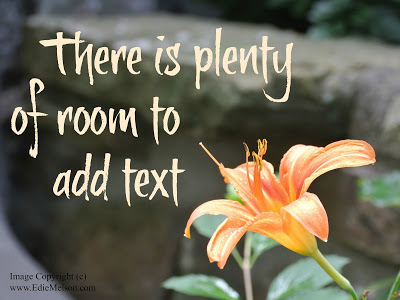 The background in this image isn't busy and there is plenty of room to add text.
The background in this image isn't busy and there is plenty of room to add text.
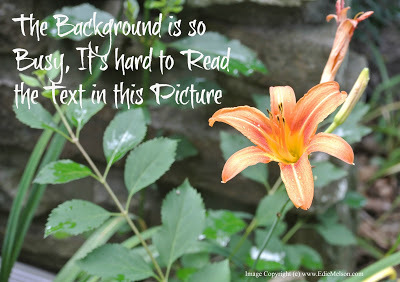 This background is busy, and there isn't a blank space to fit the words in easily.These are just some of the basic images I try to keep in a file of pics for my blog posts. There is literally no end to the list. But this should get you started and help you begin to look at the world around you from a new perspective.
This background is busy, and there isn't a blank space to fit the words in easily.These are just some of the basic images I try to keep in a file of pics for my blog posts. There is literally no end to the list. But this should get you started and help you begin to look at the world around you from a new perspective.
I’d love to know what you’d add to the list. Be sure to leave your comments in the section below.
Don’t forget to join the conversation!Blessings,Edie
TWEETABLESA List of 35 Blog Images You Can Take Yourself - @EdieMelson (Click to Tweet)
Build Your Library of Blog Images with Pictures You TakeYourself - @EdieMelson (Click to Tweet)
 I’ve shared several posts about where to find images for your blog. But one thing I haven’t covered is a list of images you could take with your own camera. I’m always on the lookout for images that I could use to illustrate a post. In my mind, I have a list of things I always need.
I’ve shared several posts about where to find images for your blog. But one thing I haven’t covered is a list of images you could take with your own camera. I’m always on the lookout for images that I could use to illustrate a post. In my mind, I have a list of things I always need. Today I’m going to write that list out and share it with you.
Before I start though, it’s important to remember that you don’t have to be professional photographer to take your own pictures. You can use a fancy camera, a point and shoot, or even your cell phone. Personally, I use my Nikon point and shoot and my iPhone 6 to take a lot of the images you see on my site.Things to look for that will build your library of blog images:1. A Wall. It can be a brick, stone or any kind of wall. But when we’re talking about obstacles in a blog post, this can be a great visual.
 A Gate.2. A Gate. I have pictures of open gates and closed gates. Again, good images if you’re talking about traveling.
A Gate.2. A Gate. I have pictures of open gates and closed gates. Again, good images if you’re talking about traveling.3. A Path. I have dozens of path pictures. I have paths in the woods, paved paths, paths that divide, paths that go downhill and paths that go uphill.
4. A Tunnel. This is great if you’re talking about the light at the end of the tunnel. It’s also a good way to illustrate going through tough times.
5. An Obstacle. I have pictures of a trail with a tree blocking the path. I also have pics of detour signs, roadblocks, etc.
6. Traffic Signs. Again, detour signs, Road Closed, Yield, Winding Road, etc.
 Rain.7. Rain. I love pictures of rainy pavement, raindrops, even puddles. These can evoke emotions and illustrate lots of things, like saving for a rainy day.
Rain.7. Rain. I love pictures of rainy pavement, raindrops, even puddles. These can evoke emotions and illustrate lots of things, like saving for a rainy day.8. Mirrors. For some reason, it’s really hard to find stock images of mirrors. I’ve solved that by taking my own. I just stand off to one side and click away.
9. The Horizon. I love taking horizon pictures. These are really good for illustrating posts about the future.
 A Cross. And I took this picture at
A Cross. And I took this picture atthe Florida Christian Writers Conference
in 2015.10. The Cross. If I see a cool cross, I usually try to snap a picture of it. And I try to find unusual angles, instead of just straight on.
11. Animal Pictures. I look for the opportunity to snap pictures of my dog and cat illustrating emotions. The one here is of my dog Jake napping. I can use this one to illustrate lazy, relaxing, etc.
12. Light Bulb. Anytime you write about finding an idea or having an idea, a light bulb is a great illustration. It can also be used anytime you refer to illumination.
13. Clouds with Sun Rays. These are great to illustrate faith and God.
14. Ripples in Water. These images are great when we write about the effect of something.
15. The Bible. Again, great for messages of faith. I take pictures of the book close, specific passages, and pages that have notes on them.
 Words in the Dictionary.16. Words in the Dictionary. Some times it’s hard to find just the right picture. Instead, look the word up in the dictionary and snap a picture. You can manipulate the picture in www.PicMonkey.comand have a great blog illustration.
Words in the Dictionary.16. Words in the Dictionary. Some times it’s hard to find just the right picture. Instead, look the word up in the dictionary and snap a picture. You can manipulate the picture in www.PicMonkey.comand have a great blog illustration.17. Computer Keyboard/Keys. Again, good for illustrating posts about writing. You can also take images that focus on a certain key, like Delete, Shift, a Question Mark, etc.
 This is my typewriter with a blank sheet of paper in it.
This is my typewriter with a blank sheet of paper in it.I added Write in Faith using PicMonkey.18. Typewriter/Typewriter Keys. This is great for us when we write about writing. You can even put a piece of blank paper in the typewriter and use a site like PicMonkey to add words to the paper.
19. Luggage. This is great when we’re talking about taking more than we can handle, carrying baggage, etc.
20. Exit/Do Not Enter Signs. These are great to illustrate posts that warn about something.
21. Doors. I take pics of open doors, partially open doors, closed doors, even locked doors.
 Funny Signs/Objects.22. Funny Signs/Objects. This is one I just took this week while we were on vacation at Universal Studios. I also have one from another amusement park that is a suspended net full of bricks. It has a sign on it that says, “A ton of bricks.”
Funny Signs/Objects.22. Funny Signs/Objects. This is one I just took this week while we were on vacation at Universal Studios. I also have one from another amusement park that is a suspended net full of bricks. It has a sign on it that says, “A ton of bricks.”
23. Chain/Lock/Key. I use chain links when I’m talking about links (as in computer links). And locks and keys are always great images.
24. Fog. This is another great image to have in your library. It evokes a lot of emotion and can illustrate uncertainty.
25. Tools. Pictures of tools can be great illustrations. I have quite a few—from a simple hammer and nails—to tools on a workbench.
26. Winding Road. Another great image to illustrate a journey.
 A Pen/Paper/Journal.27. A Pen/Paper/Journal. This is another image that I use a lot more than I thought I would. It's easy to set up and take yourself.
A Pen/Paper/Journal.27. A Pen/Paper/Journal. This is another image that I use a lot more than I thought I would. It's easy to set up and take yourself.
28. A Clock. Any time you're writing about time, a clock is a good way to illustrate that.
29. A Foundation. This is another image that's really useful and hard to find. So if you're near a construction site and can snap a quick pic, do it.
30. Spring/Summer/Winter/Fall. We reference the seasons a lot when we write, so having images available to illustrate that is a big help.
 31. Stairs/Staircase. A great way to illustrate change.
31. Stairs/Staircase. A great way to illustrate change.
32. A Bridge. Like several others I've mentioned, a picture of a bridge is a great way to illustrate a variety of posts.
33. A Reflection. This isn't necessarily in a mirror, it can be in a window, in water, anywhere.
34. A Window. Another staple for bloggers, no matter what the focus of your site.
35. Fire/Candle/Fireplace. All excellent for illustrating subjects like ignite, warmth, etc.
Two important tips when you’re taking & using these images: First: Always include your contact info on any image you took yourself. I use PicMonkey to add the following somewhere on the picture:Image Copyright (c) www.EdieMelson.com
This does a couple of things. It reminds people that someone owns the image and it's not just free to use without permission. It also is free advertising because it directs people back to my site, if the image shows up on social media anywhere. (NOTE: you can see my watermark in the first image on this blog)
Second: Think of composing the picture so there is room to add words to the image to make a meme. (Review: A meme is an image with words on it. The first image for this post is a meme.) Try to keep your background simple. Below are two images, one with room for words, one without room.
 The background in this image isn't busy and there is plenty of room to add text.
The background in this image isn't busy and there is plenty of room to add text. This background is busy, and there isn't a blank space to fit the words in easily.These are just some of the basic images I try to keep in a file of pics for my blog posts. There is literally no end to the list. But this should get you started and help you begin to look at the world around you from a new perspective.
This background is busy, and there isn't a blank space to fit the words in easily.These are just some of the basic images I try to keep in a file of pics for my blog posts. There is literally no end to the list. But this should get you started and help you begin to look at the world around you from a new perspective.I’d love to know what you’d add to the list. Be sure to leave your comments in the section below.
Don’t forget to join the conversation!Blessings,Edie
TWEETABLESA List of 35 Blog Images You Can Take Yourself - @EdieMelson (Click to Tweet)
Build Your Library of Blog Images with Pictures You TakeYourself - @EdieMelson (Click to Tweet)
Published on January 25, 2016 01:00
January 24, 2016
The Confidence to Be Creative in Writing
by Brenda McGraw @BrendaMMcGraw
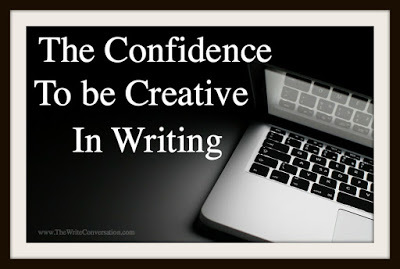 As I was walking past my office, I seemed to be able to find everything under the sun to distract me from what I needed to get done. There was mail to be opened, bills to pay, phone calls that needed to be returned, not to mention the stacks of papers and files that needed to be filed away where they belonged.
As I was walking past my office, I seemed to be able to find everything under the sun to distract me from what I needed to get done. There was mail to be opened, bills to pay, phone calls that needed to be returned, not to mention the stacks of papers and files that needed to be filed away where they belonged.
Remembering that a deadline was quickly approaching for an article that needed to be written, with no vision of what it would even be about, I found myself stuck.How many times do we procrastinate until the last minute on starting a piece of writing for the website or magazine that is waiting for it? The months quickly pass by and we just let all the distractions of life swallow us up until we get that awful feeling of being overwhelmed.
Recently a question was posed in one of Jeff Goins’ Facebook groups: “True or false: You hate writing but love having written.” Jeff received 104 comments on this one question. What would your answer be? Do you love or hate to write?
My answer was, “False, I love writing.” I love the art of writing and count it a privilege to be able to be creative and share my words with those who read them. Of course, it is a blessing to also be able to “love having written” the words and be finished with the task that looms ahead, but the art is in the creating.
 Has God called you to write?Has God called you to write? Has this been confirmed through a scripture, a message you heard, another person or a pastor? Have you had the check in your spirit and can pinpoint the actual moment, day and year that God spoke to you and you heard Him say, “You need to share your story and mine”?
Has God called you to write?Has God called you to write? Has this been confirmed through a scripture, a message you heard, another person or a pastor? Have you had the check in your spirit and can pinpoint the actual moment, day and year that God spoke to you and you heard Him say, “You need to share your story and mine”?
If the answer is, “Yes, I have been called to write,” therein lies your confidence to create what only you can create. It doesn’t matter if there are 1,000 better writers than you who have authored numerous books and you have yet to publish one; you have been commanded by the God of the universe to share your story, and His story through the beautiful art of words. The best answer to that calling is, “Yes, Lord!”
God will give us the confidence, but His first desire is to humble us to the point where we know it is not about us, it is all about Him.
Ways to obtain the confidence from God:Seek and trust His direction.Follow His leading.Pray for open doors.Learn daily.Listen to those who are farther along then you are.Practice.Fear not.Don’t fret.Be happy.Be thankful.
God does the anointing of His words; we just need to be obedient in writing them down. Many times it is the starting that is the hardest part. It’s finding the inspiration that starts our juices flowing, so to speak, until the words just flow from our mind, to our fingertips typing on the keyboard.
Ah, the joy of writing. It is a blessing beyond all I ever knew before I finally said, ‘Yes, Lord.”
You can do it. God doesn’t need us to do this writing, He allowsus to do it. We are just His vessels. I want to jump and shout and proclaim victory when a piece is finished. Don’t you?
Ask God to give you confidence to create a mighty piece of art that He will anoint and use for His glory. Will you do that?
“Your testimonies are wonderful;therefore my soul keeps them.The unfolding of your words gives light;it imparts understanding to the simple.I open my mouth and pant,because I long for your commandments.Turn to me and be gracious to me,as is your way with those who love your name.” Psalm 119:129-132
TWEETABLEThe confidence to be creative in #writing - @BrendaMMcGraw on @EdieMelson (Click to Tweet)
 Brenda McGraw is an author and speaker who reveals how to discover joy beyond the clutter of life. She draws from her own life experiences in the #1 Amazon Best seller, “Joy Beyond, 28 Days to Finding Joy Beyond the Clutter of Life”. She is the founder of Ask God Today Ministries where she has a team of writers sharing truth and hope with others.
Brenda McGraw is an author and speaker who reveals how to discover joy beyond the clutter of life. She draws from her own life experiences in the #1 Amazon Best seller, “Joy Beyond, 28 Days to Finding Joy Beyond the Clutter of Life”. She is the founder of Ask God Today Ministries where she has a team of writers sharing truth and hope with others.
Brenda currently lives in South Carolina with her husband, Jeff and three of their five children. She is a survivor of breast cancer and a heart attack.. Despite the challenges she has endured, Brenda found peace through her relationship with Jesus Christ.
You can connect with Brenda at:Website - http://www.askgodtoday.com Amazon Author Page: http://www.amazon.com/Brenda-McGraw/e/B00GOIE7AG Twitter: https://www.twitter.com/BrendaMMcGraw
 As I was walking past my office, I seemed to be able to find everything under the sun to distract me from what I needed to get done. There was mail to be opened, bills to pay, phone calls that needed to be returned, not to mention the stacks of papers and files that needed to be filed away where they belonged.
As I was walking past my office, I seemed to be able to find everything under the sun to distract me from what I needed to get done. There was mail to be opened, bills to pay, phone calls that needed to be returned, not to mention the stacks of papers and files that needed to be filed away where they belonged. Remembering that a deadline was quickly approaching for an article that needed to be written, with no vision of what it would even be about, I found myself stuck.How many times do we procrastinate until the last minute on starting a piece of writing for the website or magazine that is waiting for it? The months quickly pass by and we just let all the distractions of life swallow us up until we get that awful feeling of being overwhelmed.
Recently a question was posed in one of Jeff Goins’ Facebook groups: “True or false: You hate writing but love having written.” Jeff received 104 comments on this one question. What would your answer be? Do you love or hate to write?
My answer was, “False, I love writing.” I love the art of writing and count it a privilege to be able to be creative and share my words with those who read them. Of course, it is a blessing to also be able to “love having written” the words and be finished with the task that looms ahead, but the art is in the creating.
 Has God called you to write?Has God called you to write? Has this been confirmed through a scripture, a message you heard, another person or a pastor? Have you had the check in your spirit and can pinpoint the actual moment, day and year that God spoke to you and you heard Him say, “You need to share your story and mine”?
Has God called you to write?Has God called you to write? Has this been confirmed through a scripture, a message you heard, another person or a pastor? Have you had the check in your spirit and can pinpoint the actual moment, day and year that God spoke to you and you heard Him say, “You need to share your story and mine”?If the answer is, “Yes, I have been called to write,” therein lies your confidence to create what only you can create. It doesn’t matter if there are 1,000 better writers than you who have authored numerous books and you have yet to publish one; you have been commanded by the God of the universe to share your story, and His story through the beautiful art of words. The best answer to that calling is, “Yes, Lord!”
God will give us the confidence, but His first desire is to humble us to the point where we know it is not about us, it is all about Him.
Ways to obtain the confidence from God:Seek and trust His direction.Follow His leading.Pray for open doors.Learn daily.Listen to those who are farther along then you are.Practice.Fear not.Don’t fret.Be happy.Be thankful.
God does the anointing of His words; we just need to be obedient in writing them down. Many times it is the starting that is the hardest part. It’s finding the inspiration that starts our juices flowing, so to speak, until the words just flow from our mind, to our fingertips typing on the keyboard.
Ah, the joy of writing. It is a blessing beyond all I ever knew before I finally said, ‘Yes, Lord.”
You can do it. God doesn’t need us to do this writing, He allowsus to do it. We are just His vessels. I want to jump and shout and proclaim victory when a piece is finished. Don’t you?
Ask God to give you confidence to create a mighty piece of art that He will anoint and use for His glory. Will you do that?
“Your testimonies are wonderful;therefore my soul keeps them.The unfolding of your words gives light;it imparts understanding to the simple.I open my mouth and pant,because I long for your commandments.Turn to me and be gracious to me,as is your way with those who love your name.” Psalm 119:129-132
TWEETABLEThe confidence to be creative in #writing - @BrendaMMcGraw on @EdieMelson (Click to Tweet)
 Brenda McGraw is an author and speaker who reveals how to discover joy beyond the clutter of life. She draws from her own life experiences in the #1 Amazon Best seller, “Joy Beyond, 28 Days to Finding Joy Beyond the Clutter of Life”. She is the founder of Ask God Today Ministries where she has a team of writers sharing truth and hope with others.
Brenda McGraw is an author and speaker who reveals how to discover joy beyond the clutter of life. She draws from her own life experiences in the #1 Amazon Best seller, “Joy Beyond, 28 Days to Finding Joy Beyond the Clutter of Life”. She is the founder of Ask God Today Ministries where she has a team of writers sharing truth and hope with others.
Brenda currently lives in South Carolina with her husband, Jeff and three of their five children. She is a survivor of breast cancer and a heart attack.. Despite the challenges she has endured, Brenda found peace through her relationship with Jesus Christ.
You can connect with Brenda at:Website - http://www.askgodtoday.com Amazon Author Page: http://www.amazon.com/Brenda-McGraw/e/B00GOIE7AG Twitter: https://www.twitter.com/BrendaMMcGraw
Published on January 24, 2016 01:00
January 22, 2016
Why Should I Attend a Writing Conference?
by Lori Hatcher @LoriHatcher2
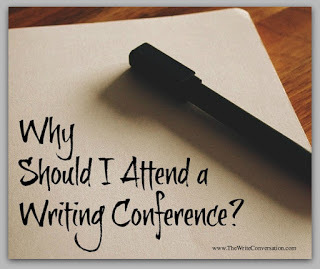 “Tell me why I should go to a writers conference,” my friend Melissa said. “I’m swamped at work, discouraged about my writing, and behind on my W.I.P. (Work In Progress). I’m not sure I can afford the time away.”
“Tell me why I should go to a writers conference,” my friend Melissa said. “I’m swamped at work, discouraged about my writing, and behind on my W.I.P. (Work In Progress). I’m not sure I can afford the time away.”
Melissa and I have commiserated on the ups and downs of the writing life for years. She’s a seasoned writer who could probably teach most of the conference workshops. She doesn’t need another class on self-editing or how to write dialogue. Yet I still encouraged her to attend.Here’s why:
1. A writer’s life is hard. We get weary. We lose sight of the big picture. Sometimes we’re not even sure what the big picture is. A strategically timed Christian writers conference reminds us that we are not the genesis of our work—God is. It is “God, who is working in you, enabling you, both to will and to act for His good purpose” (Philippians 2:13).
I get discouraged when I think it’s all up to me—that it’s my ideas, my creativity, and my energy that propels my writing life forward. The wise mentors at a good Christian writers’ conference remind me this is backward. My responsibility is to pray hard, work hard, and trust God with the results.
 2. If left to myself, I would work all day every day, always pouring out, and never taking in. And I would be an empty vessel with nothing left to give. Writers’ conferences fill me up again. Instead of wasting time, I’m actually investing time in my future writing. I come away inspired, encouraged, and filled with enthusiasm. I think I’m losing time, when in reality, I’m gaining time, because the energy and inspiration I receive empowers and propels me forward.
2. If left to myself, I would work all day every day, always pouring out, and never taking in. And I would be an empty vessel with nothing left to give. Writers’ conferences fill me up again. Instead of wasting time, I’m actually investing time in my future writing. I come away inspired, encouraged, and filled with enthusiasm. I think I’m losing time, when in reality, I’m gaining time, because the energy and inspiration I receive empowers and propels me forward.
3. Writers’ conferences remind me of why I love being a writer. From the starry-eyed newbies who just wrote their first blog post to the seasoned authors working on their tenth book, my fellow writers share the crazy desire to change the world through the written world and help me believe it can be done.
Who else cares whether I use a serial comma? Who else spends 30 minutes combing through a thesaurus to find THE word? Who else goes without sleep, food, or showers to birth a book baby? Only crazy writers, God-called writers, God-inspired writers who get it and really understand that “in the beginning was the Word, and the Word was with God and the Word WAS God,” and God is still using words to change the world.
4. Writers conferences give me space to breathe, and dream, and hope. The grind of the daily writing life squeezes this out. The beautiful setting of a writers conference lifts my eyes beyond the page, my desk, and my life. It reminds me that the world is big and beautiful, God is even bigger and more beautiful, and he created me to be part of his big, beautiful work in the world.
5. Writers’ conferences provide an opportunity to give back. Eddie Jones, one of the founders of Writers Advance Boot Camp, was the first person who said to me, “This could be a book.” Two years later, it was. Also at that conference I learned a simple method for writing a Christian devotion. Within a year, magazines were paying me for my writing. Fellow writers I’ve met at conferences have become my mentors, colleagues, and friends. I wouldn’t be where I am today in my writing life if I hadn’t attended at least one writers conference every year since 2011.
Whether I’m volunteering at a registration table, leading a workshop on how to use Pinterest to grow your blog, or praying for the conference leaders and directors, attending writers conferences gives me a chance to pay it forward. It allows me to invest in others the way others have invested in me—and repay a debt of gratitude.
6. Writers’ conferences introduce me to friends... friends who are interested in what God has called me to do. Friends who will talk me off the ledge when I’m ready to end it all. Friends who will snatch my manuscript out of my hands the second before I toss it into the flames. And friends who will help me feed it into the flames when necessary while simultaneously helping me plan the next, better, stronger project.
I don’t have the time or the money to attend a Christian writers’ conference every year, but I go anyway. The way I see it, I can’t afford not to.
TWEETABLEWhy should I attend a #writing conference? @LoriHatcher2 on @EdieMelson (Click to Tweet)
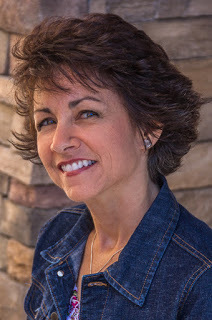 Lori Hatcher is an author, blogger, and women’s ministry speaker. She’s the editor of South Carolina’s Reach Out, Columbia magazine, and has authored two devotional books, Hungry for God … Starving for Time, Five-Minute Devotions for Busy Women and Joy in the Journey – Encouragement for Homeschooling Moms. An award-winning Toastmasters International speaker and Christian Communicators grad, she uses her speaking and writing ministry to help busy women connect with God in the craziness of life. You’ll find her pondering the marvelous and the mundane on her blog, Hungry for God. . . Starving for Time (www.LoriHatcher.com).
Lori Hatcher is an author, blogger, and women’s ministry speaker. She’s the editor of South Carolina’s Reach Out, Columbia magazine, and has authored two devotional books, Hungry for God … Starving for Time, Five-Minute Devotions for Busy Women and Joy in the Journey – Encouragement for Homeschooling Moms. An award-winning Toastmasters International speaker and Christian Communicators grad, she uses her speaking and writing ministry to help busy women connect with God in the craziness of life. You’ll find her pondering the marvelous and the mundane on her blog, Hungry for God. . . Starving for Time (www.LoriHatcher.com).
 “Tell me why I should go to a writers conference,” my friend Melissa said. “I’m swamped at work, discouraged about my writing, and behind on my W.I.P. (Work In Progress). I’m not sure I can afford the time away.”
“Tell me why I should go to a writers conference,” my friend Melissa said. “I’m swamped at work, discouraged about my writing, and behind on my W.I.P. (Work In Progress). I’m not sure I can afford the time away.”Melissa and I have commiserated on the ups and downs of the writing life for years. She’s a seasoned writer who could probably teach most of the conference workshops. She doesn’t need another class on self-editing or how to write dialogue. Yet I still encouraged her to attend.Here’s why:
1. A writer’s life is hard. We get weary. We lose sight of the big picture. Sometimes we’re not even sure what the big picture is. A strategically timed Christian writers conference reminds us that we are not the genesis of our work—God is. It is “God, who is working in you, enabling you, both to will and to act for His good purpose” (Philippians 2:13).
I get discouraged when I think it’s all up to me—that it’s my ideas, my creativity, and my energy that propels my writing life forward. The wise mentors at a good Christian writers’ conference remind me this is backward. My responsibility is to pray hard, work hard, and trust God with the results.
 2. If left to myself, I would work all day every day, always pouring out, and never taking in. And I would be an empty vessel with nothing left to give. Writers’ conferences fill me up again. Instead of wasting time, I’m actually investing time in my future writing. I come away inspired, encouraged, and filled with enthusiasm. I think I’m losing time, when in reality, I’m gaining time, because the energy and inspiration I receive empowers and propels me forward.
2. If left to myself, I would work all day every day, always pouring out, and never taking in. And I would be an empty vessel with nothing left to give. Writers’ conferences fill me up again. Instead of wasting time, I’m actually investing time in my future writing. I come away inspired, encouraged, and filled with enthusiasm. I think I’m losing time, when in reality, I’m gaining time, because the energy and inspiration I receive empowers and propels me forward.3. Writers’ conferences remind me of why I love being a writer. From the starry-eyed newbies who just wrote their first blog post to the seasoned authors working on their tenth book, my fellow writers share the crazy desire to change the world through the written world and help me believe it can be done.
Who else cares whether I use a serial comma? Who else spends 30 minutes combing through a thesaurus to find THE word? Who else goes without sleep, food, or showers to birth a book baby? Only crazy writers, God-called writers, God-inspired writers who get it and really understand that “in the beginning was the Word, and the Word was with God and the Word WAS God,” and God is still using words to change the world.
4. Writers conferences give me space to breathe, and dream, and hope. The grind of the daily writing life squeezes this out. The beautiful setting of a writers conference lifts my eyes beyond the page, my desk, and my life. It reminds me that the world is big and beautiful, God is even bigger and more beautiful, and he created me to be part of his big, beautiful work in the world.
5. Writers’ conferences provide an opportunity to give back. Eddie Jones, one of the founders of Writers Advance Boot Camp, was the first person who said to me, “This could be a book.” Two years later, it was. Also at that conference I learned a simple method for writing a Christian devotion. Within a year, magazines were paying me for my writing. Fellow writers I’ve met at conferences have become my mentors, colleagues, and friends. I wouldn’t be where I am today in my writing life if I hadn’t attended at least one writers conference every year since 2011.
Whether I’m volunteering at a registration table, leading a workshop on how to use Pinterest to grow your blog, or praying for the conference leaders and directors, attending writers conferences gives me a chance to pay it forward. It allows me to invest in others the way others have invested in me—and repay a debt of gratitude.
6. Writers’ conferences introduce me to friends... friends who are interested in what God has called me to do. Friends who will talk me off the ledge when I’m ready to end it all. Friends who will snatch my manuscript out of my hands the second before I toss it into the flames. And friends who will help me feed it into the flames when necessary while simultaneously helping me plan the next, better, stronger project.
I don’t have the time or the money to attend a Christian writers’ conference every year, but I go anyway. The way I see it, I can’t afford not to.
TWEETABLEWhy should I attend a #writing conference? @LoriHatcher2 on @EdieMelson (Click to Tweet)
 Lori Hatcher is an author, blogger, and women’s ministry speaker. She’s the editor of South Carolina’s Reach Out, Columbia magazine, and has authored two devotional books, Hungry for God … Starving for Time, Five-Minute Devotions for Busy Women and Joy in the Journey – Encouragement for Homeschooling Moms. An award-winning Toastmasters International speaker and Christian Communicators grad, she uses her speaking and writing ministry to help busy women connect with God in the craziness of life. You’ll find her pondering the marvelous and the mundane on her blog, Hungry for God. . . Starving for Time (www.LoriHatcher.com).
Lori Hatcher is an author, blogger, and women’s ministry speaker. She’s the editor of South Carolina’s Reach Out, Columbia magazine, and has authored two devotional books, Hungry for God … Starving for Time, Five-Minute Devotions for Busy Women and Joy in the Journey – Encouragement for Homeschooling Moms. An award-winning Toastmasters International speaker and Christian Communicators grad, she uses her speaking and writing ministry to help busy women connect with God in the craziness of life. You’ll find her pondering the marvelous and the mundane on her blog, Hungry for God. . . Starving for Time (www.LoriHatcher.com).
Published on January 22, 2016 01:00
January 21, 2016
3 Things I Learned in My First Days as a Literary Agent… (Part 1)
by Cyle Young @CyleYoung
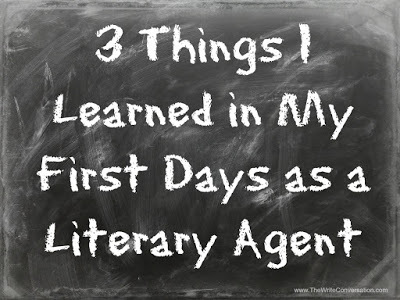 A couple of months ago, I began the new and exciting adventure of becoming a literary agent with Hartline Literary Agency. The last few months have brought a whirlwind of information, learning, emails, reading manuscript submissions, and signing clients.
A couple of months ago, I began the new and exciting adventure of becoming a literary agent with Hartline Literary Agency. The last few months have brought a whirlwind of information, learning, emails, reading manuscript submissions, and signing clients.
In just a matter of days, my inbox became flooded with submissions from authors seeking representation, and as I reviewed manuscript after manuscript and proposal after proposal, a few significant trends came to light. In an effort to help other authors on their writing journey, I will share a few of those insights with you.I am passionate about assisting writers who desire to become authors, and I sincerely hope some of these takeaways will help you acquire an agent or get your manuscript accepted by a publisher.
 1. If you don’t know what a book proposal is or what it should look like, then you are most likely a novice writer that still needs to learn more about the craft. Don’t get discouraged, every author started there too. My advice is simple, attend some writing conferences, get a writing coach, and/or take a writing class. Continue to learn more about the publishing industry and the submission process while you improve your writing ability. You will get published faster if you hone your craft first. If you try to get published before your writing ability is at an adequate level, you may find yourself rejected and discouraged.
1. If you don’t know what a book proposal is or what it should look like, then you are most likely a novice writer that still needs to learn more about the craft. Don’t get discouraged, every author started there too. My advice is simple, attend some writing conferences, get a writing coach, and/or take a writing class. Continue to learn more about the publishing industry and the submission process while you improve your writing ability. You will get published faster if you hone your craft first. If you try to get published before your writing ability is at an adequate level, you may find yourself rejected and discouraged.
2. If your manuscript is full of red and green highlights in a word processing software like Word—don’t submit it—it’s full of mistakes. Take time to properly edit your manuscript, and at the minimum, run a spelling and grammar check before you submit. I’ll be honest, when I see a document that’s all marked up, I know the writer isn’t serious about the manuscript. Unfortunately, if the writer isn’t serious about his book, then I won’t be either. Always put your best foot forward.
 3. If you’ve never written a book before, make sure you follow writing rules and standards.Your book needs to be completed before submission. It should be written at an adequate and predictable word count for your genre. Make sure your manuscript has been edited and reviewed by someone other than you, preferably someone who has a good deal of industry experience or knowledge. I want to read your book, but I’ll be able to tell by the end of the first chapter whether or not someone else has edited it.
3. If you’ve never written a book before, make sure you follow writing rules and standards.Your book needs to be completed before submission. It should be written at an adequate and predictable word count for your genre. Make sure your manuscript has been edited and reviewed by someone other than you, preferably someone who has a good deal of industry experience or knowledge. I want to read your book, but I’ll be able to tell by the end of the first chapter whether or not someone else has edited it.
I hope these observations help you if you polish up your submissions. No one wants to have their manuscript rejected because of some simple mistakes or oversights. Take time to raise your industry awareness and hone your writing ability, it’ll pay off one day. The publishing industry moves at a snails pace, so take a little extra time and present your best work first.
TWEETABLES
3 Things I Learned in My First Days as a Literary Agent - @CyleYoung (Click to Tweet)
Publishing tips from literary agent @CyleYoung on @EdieMelson (Click to Tweet)
 Cyle Young is thankful God blessed him with the uniqueness of being an ADD-riddled…SQUIRREL!...binge writer. Not much unlike the classic video game Frogger, Cyle darts back and forth between various writing genres. He crafts princess children’s stories, how-to advice for parents, epic fantasy tales, and easy readers.
Cyle Young is thankful God blessed him with the uniqueness of being an ADD-riddled…SQUIRREL!...binge writer. Not much unlike the classic video game Frogger, Cyle darts back and forth between various writing genres. He crafts princess children’s stories, how-to advice for parents, epic fantasy tales, and easy readers.
 A couple of months ago, I began the new and exciting adventure of becoming a literary agent with Hartline Literary Agency. The last few months have brought a whirlwind of information, learning, emails, reading manuscript submissions, and signing clients.
A couple of months ago, I began the new and exciting adventure of becoming a literary agent with Hartline Literary Agency. The last few months have brought a whirlwind of information, learning, emails, reading manuscript submissions, and signing clients. In just a matter of days, my inbox became flooded with submissions from authors seeking representation, and as I reviewed manuscript after manuscript and proposal after proposal, a few significant trends came to light. In an effort to help other authors on their writing journey, I will share a few of those insights with you.I am passionate about assisting writers who desire to become authors, and I sincerely hope some of these takeaways will help you acquire an agent or get your manuscript accepted by a publisher.
 1. If you don’t know what a book proposal is or what it should look like, then you are most likely a novice writer that still needs to learn more about the craft. Don’t get discouraged, every author started there too. My advice is simple, attend some writing conferences, get a writing coach, and/or take a writing class. Continue to learn more about the publishing industry and the submission process while you improve your writing ability. You will get published faster if you hone your craft first. If you try to get published before your writing ability is at an adequate level, you may find yourself rejected and discouraged.
1. If you don’t know what a book proposal is or what it should look like, then you are most likely a novice writer that still needs to learn more about the craft. Don’t get discouraged, every author started there too. My advice is simple, attend some writing conferences, get a writing coach, and/or take a writing class. Continue to learn more about the publishing industry and the submission process while you improve your writing ability. You will get published faster if you hone your craft first. If you try to get published before your writing ability is at an adequate level, you may find yourself rejected and discouraged.2. If your manuscript is full of red and green highlights in a word processing software like Word—don’t submit it—it’s full of mistakes. Take time to properly edit your manuscript, and at the minimum, run a spelling and grammar check before you submit. I’ll be honest, when I see a document that’s all marked up, I know the writer isn’t serious about the manuscript. Unfortunately, if the writer isn’t serious about his book, then I won’t be either. Always put your best foot forward.
 3. If you’ve never written a book before, make sure you follow writing rules and standards.Your book needs to be completed before submission. It should be written at an adequate and predictable word count for your genre. Make sure your manuscript has been edited and reviewed by someone other than you, preferably someone who has a good deal of industry experience or knowledge. I want to read your book, but I’ll be able to tell by the end of the first chapter whether or not someone else has edited it.
3. If you’ve never written a book before, make sure you follow writing rules and standards.Your book needs to be completed before submission. It should be written at an adequate and predictable word count for your genre. Make sure your manuscript has been edited and reviewed by someone other than you, preferably someone who has a good deal of industry experience or knowledge. I want to read your book, but I’ll be able to tell by the end of the first chapter whether or not someone else has edited it.I hope these observations help you if you polish up your submissions. No one wants to have their manuscript rejected because of some simple mistakes or oversights. Take time to raise your industry awareness and hone your writing ability, it’ll pay off one day. The publishing industry moves at a snails pace, so take a little extra time and present your best work first.
TWEETABLES
3 Things I Learned in My First Days as a Literary Agent - @CyleYoung (Click to Tweet)
Publishing tips from literary agent @CyleYoung on @EdieMelson (Click to Tweet)
 Cyle Young is thankful God blessed him with the uniqueness of being an ADD-riddled…SQUIRREL!...binge writer. Not much unlike the classic video game Frogger, Cyle darts back and forth between various writing genres. He crafts princess children’s stories, how-to advice for parents, epic fantasy tales, and easy readers.
Cyle Young is thankful God blessed him with the uniqueness of being an ADD-riddled…SQUIRREL!...binge writer. Not much unlike the classic video game Frogger, Cyle darts back and forth between various writing genres. He crafts princess children’s stories, how-to advice for parents, epic fantasy tales, and easy readers.
Published on January 21, 2016 01:00
January 20, 2016
7 Ways to Re-Ignite Your Writing Inspiration
by Katy Kauffman @KatyKauffman28
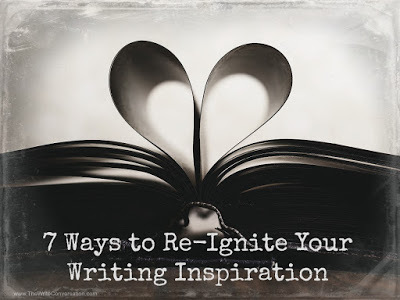 Some days the words just don’t come. I sit at my desk and look at the computer screen. I wait for a sense of inspiration to wash over me, and … nothing. Blank page, ticking clock, and nada. I don’t even know where to start.
Some days the words just don’t come. I sit at my desk and look at the computer screen. I wait for a sense of inspiration to wash over me, and … nothing. Blank page, ticking clock, and nada. I don’t even know where to start.
If you have days like that, you’re not alone. Sometimes we can leave our computers and come back an hour later, and poof! The inspiration returns. But in case it doesn’t, here are some ways to reignite the flame of inspiration in your heart and get some words on the page—some good words that will benefit your readers.1. Pray!Asking God for wisdom and guidance is the best thing we can do before we start writing. Any time. If you’re not feeling inspired to write, ask God for an angle or a special slant on your subject. When I write, some sentences that pop into my head have to be from Him. I know I couldn’t have thought of them on my own.
2. Write what you know, or research your subject some more. If you’re stumped about what to write for your blog, write what you know. Pick a topic that you’re familiar with, and write a post from the heart. If you’re writing an article or a chapter about something that you’re unfamiliar with, research enough until you know your subject and you discover a starting point for your piece. You may not become an expert on the topic, but you can cite your sources and feel at peace with the material you’ve presented.
 Listen to your favorite playlist of music.3. Listen to your favorite playlist of music.Playing your favorite songs can blow away any “mind fog” and inspire your heart to write. If the lyrics to your favorite music distract your mind too much, pick some great instrumental music to set the right mood and reignite your inspiration.
Listen to your favorite playlist of music.3. Listen to your favorite playlist of music.Playing your favorite songs can blow away any “mind fog” and inspire your heart to write. If the lyrics to your favorite music distract your mind too much, pick some great instrumental music to set the right mood and reignite your inspiration.
4. Watch your favorite “go get ‘em” movie.I am a visual learner, and I learn a lot from movies. Some action movies inspire me to write about being all in and not giving up. I love to see a team work together, like in the new Star Trek series, or to watch a character conquer fear and other obstacles like in Tim Burton’s Alice in Wonderland. Watch a movie that inspires you to press on or make a difference, and then use the oomph you gain from the movie to write.
5. Play on Pinterest. I don’t know if male writers would consider doing this one, but Pinterest is therapeutic. (So is shopping, but it’s more expensive.) Take thirty minutes to search for cute puppy pictures, delicious-looking recipes, or creative DIY projects on Pinterest, and then return to your writing. Hopefully, you’ll be in a cheerful mood, and the creative juices will start flowing again. If Pinterest isn’t your thing, try working on your favorite hobby, or doing something that uses the creative side of your brain. Just maybe, the creativity will spill over into your writing.
 Remember what you studied for your quiet time.6. Remember what you studied for your quiet time.If you’re writing an inspirational post or article, recall the principles you learned in your quiet time that day. What things did God teach you? What truths or encouragement can you pass on to your readers? Let these inspire your writing.
Remember what you studied for your quiet time.6. Remember what you studied for your quiet time.If you’re writing an inspirational post or article, recall the principles you learned in your quiet time that day. What things did God teach you? What truths or encouragement can you pass on to your readers? Let these inspire your writing.
7. Think about your most recent struggle and victory. With God, no trial is wasted. We learn and grow through our trials, and often we find ways to encourage other people through theirs. Winning the victory over a struggle can become great inspiration in helping others to persevere. You don’t have to go into detail about your own struggle, but tap into the joy and the pain of your trial when you sit down to write. Empathize with other people’s struggles, and share what you have learned in yours.
What do you do to reignite the flame of inspiration? Share some tips, and let’s help each other stay inspired to write. Join the conversation!
TWEETABLE
7 Ways to Re-Ignite Your Writing Inspiration - @KatyKauffman28 on @EdieMelson (Click to Tweet)
 Katy Kauffman is an award-winning writer and a co-founder of Lighthouse Bible Studies, a ministry which seeks to connect people to God through His Word.
Katy Kauffman is an award-winning writer and a co-founder of Lighthouse Bible Studies, a ministry which seeks to connect people to God through His Word.
She has taught the Bible to women and teens, and has two published Bible studies for women, 2 Timothy: Winning the Victory and Faith, Courage, and Victory. She is an editor of the new Refresh Bible Study Magazine and the designer of Broken but Priceless: The Magazine. She makes her home near Atlanta, Georgia.
 Some days the words just don’t come. I sit at my desk and look at the computer screen. I wait for a sense of inspiration to wash over me, and … nothing. Blank page, ticking clock, and nada. I don’t even know where to start.
Some days the words just don’t come. I sit at my desk and look at the computer screen. I wait for a sense of inspiration to wash over me, and … nothing. Blank page, ticking clock, and nada. I don’t even know where to start.If you have days like that, you’re not alone. Sometimes we can leave our computers and come back an hour later, and poof! The inspiration returns. But in case it doesn’t, here are some ways to reignite the flame of inspiration in your heart and get some words on the page—some good words that will benefit your readers.1. Pray!Asking God for wisdom and guidance is the best thing we can do before we start writing. Any time. If you’re not feeling inspired to write, ask God for an angle or a special slant on your subject. When I write, some sentences that pop into my head have to be from Him. I know I couldn’t have thought of them on my own.
2. Write what you know, or research your subject some more. If you’re stumped about what to write for your blog, write what you know. Pick a topic that you’re familiar with, and write a post from the heart. If you’re writing an article or a chapter about something that you’re unfamiliar with, research enough until you know your subject and you discover a starting point for your piece. You may not become an expert on the topic, but you can cite your sources and feel at peace with the material you’ve presented.
 Listen to your favorite playlist of music.3. Listen to your favorite playlist of music.Playing your favorite songs can blow away any “mind fog” and inspire your heart to write. If the lyrics to your favorite music distract your mind too much, pick some great instrumental music to set the right mood and reignite your inspiration.
Listen to your favorite playlist of music.3. Listen to your favorite playlist of music.Playing your favorite songs can blow away any “mind fog” and inspire your heart to write. If the lyrics to your favorite music distract your mind too much, pick some great instrumental music to set the right mood and reignite your inspiration. 4. Watch your favorite “go get ‘em” movie.I am a visual learner, and I learn a lot from movies. Some action movies inspire me to write about being all in and not giving up. I love to see a team work together, like in the new Star Trek series, or to watch a character conquer fear and other obstacles like in Tim Burton’s Alice in Wonderland. Watch a movie that inspires you to press on or make a difference, and then use the oomph you gain from the movie to write.
5. Play on Pinterest. I don’t know if male writers would consider doing this one, but Pinterest is therapeutic. (So is shopping, but it’s more expensive.) Take thirty minutes to search for cute puppy pictures, delicious-looking recipes, or creative DIY projects on Pinterest, and then return to your writing. Hopefully, you’ll be in a cheerful mood, and the creative juices will start flowing again. If Pinterest isn’t your thing, try working on your favorite hobby, or doing something that uses the creative side of your brain. Just maybe, the creativity will spill over into your writing.
 Remember what you studied for your quiet time.6. Remember what you studied for your quiet time.If you’re writing an inspirational post or article, recall the principles you learned in your quiet time that day. What things did God teach you? What truths or encouragement can you pass on to your readers? Let these inspire your writing.
Remember what you studied for your quiet time.6. Remember what you studied for your quiet time.If you’re writing an inspirational post or article, recall the principles you learned in your quiet time that day. What things did God teach you? What truths or encouragement can you pass on to your readers? Let these inspire your writing. 7. Think about your most recent struggle and victory. With God, no trial is wasted. We learn and grow through our trials, and often we find ways to encourage other people through theirs. Winning the victory over a struggle can become great inspiration in helping others to persevere. You don’t have to go into detail about your own struggle, but tap into the joy and the pain of your trial when you sit down to write. Empathize with other people’s struggles, and share what you have learned in yours.
What do you do to reignite the flame of inspiration? Share some tips, and let’s help each other stay inspired to write. Join the conversation!
TWEETABLE
7 Ways to Re-Ignite Your Writing Inspiration - @KatyKauffman28 on @EdieMelson (Click to Tweet)
 Katy Kauffman is an award-winning writer and a co-founder of Lighthouse Bible Studies, a ministry which seeks to connect people to God through His Word.
Katy Kauffman is an award-winning writer and a co-founder of Lighthouse Bible Studies, a ministry which seeks to connect people to God through His Word. She has taught the Bible to women and teens, and has two published Bible studies for women, 2 Timothy: Winning the Victory and Faith, Courage, and Victory. She is an editor of the new Refresh Bible Study Magazine and the designer of Broken but Priceless: The Magazine. She makes her home near Atlanta, Georgia.
Published on January 20, 2016 01:00
January 19, 2016
How to be Friends with Fellow Writers & Speakers
by Lucinda Secrest McDowell @LucindaSMcDowel
 I just returned home from my annual retreat with two dozen other authors and speakers—a time where we unplug and pray and share life with one another as we listen to God for the upcoming new year.
I just returned home from my annual retreat with two dozen other authors and speakers—a time where we unplug and pray and share life with one another as we listen to God for the upcoming new year.
In reflecting on this time, I realized that having true friends “in the business” is a privilege not to be taken for granted.
While I have certainly not always been this kind of friend, I’d like to offer a dozen principles on nurturing such relationships.
12 Tips to Nurture Friendships with Fellow Writers/SpeakersNever Compare – I know it’s hard to refrain from comparisons, but competition can kill a friendship. Please recognize that you both have strengths and unique stories to share. Don’t try to imitate her professional journey or personal style. Be confident in who you are and what you have to offer.Keep Confidences – Nothing destroys a friendship (personal or professional) faster than telling secrets. Be a person your friend can trust, whether she talks to you about her new proposal, her $ advance, or a family struggle. Promote your friend publicly.Promote Your Friend Publicly - Praise them on social media and recognize their contribution to your life (or even your work) when appropriate. Be their cheerleader.Brainstorm Together – One great service we can perform with our friends in the publishing industry is brainstorming over titles or plot devices or platform expanding. Listen. Then, be an authentic soundboard and
always be kind
.Refer Them When Appropriate – Chances are you may one day be asked to speak at an event (or write a book) on a theme that is not your forte, but fits your friend perfectly. How gracious if you recommend him as an even better expert on the subject.Plan Appointments – If you are both going to be at the same convention, sharing a platform, or even an airport, plan in advance a time for one-to-one catch up if at all possible. This shows how much you value keeping in touch.Share their Joys – Make a deliberate effort to congratulate them on a new book release or an award nomination or win. Chances are nobody “at home” noticed, so your words will be especially appreciated. After all, this friend “knows-what-your-life-is-like.”
Promote your friend publicly.Promote Your Friend Publicly - Praise them on social media and recognize their contribution to your life (or even your work) when appropriate. Be their cheerleader.Brainstorm Together – One great service we can perform with our friends in the publishing industry is brainstorming over titles or plot devices or platform expanding. Listen. Then, be an authentic soundboard and
always be kind
.Refer Them When Appropriate – Chances are you may one day be asked to speak at an event (or write a book) on a theme that is not your forte, but fits your friend perfectly. How gracious if you recommend him as an even better expert on the subject.Plan Appointments – If you are both going to be at the same convention, sharing a platform, or even an airport, plan in advance a time for one-to-one catch up if at all possible. This shows how much you value keeping in touch.Share their Joys – Make a deliberate effort to congratulate them on a new book release or an award nomination or win. Chances are nobody “at home” noticed, so your words will be especially appreciated. After all, this friend “knows-what-your-life-is-like.”
 Endorse their work.Endorse their Work – If asked and you are able, seek to endorse their books or give a speaking endorsement for their website. “Do send me the manuscript and I will consider writing an endorsement if at all possible.”Don’t Use Them – Yes, our professional friends have all sorts of contacts and while there is nothing wrong with occasionally asking them to mention us to that event planner or editor, try not to make this a habit or certainly not the basis of your friendship.Keep Expectations Loose – Your friend is your friend but she is also friends with many other authors and speakers. So don’t expect to always be included in her gatherings and don’t assume rejection when you see her posts on social media.Welcome New People in Your Life – There will always be close friends, but don’t gravitate to them exclusively at professional events. Reach out to welcome new people into your life and expect a blessing. Everyone doesn’t have to be a ‘best friend.’Pray for Them – And by that, I mean don’t justsay you will pray for them, do it! If possible, pray over specific requests (or dates or deadlines) that they share with you. Though this is listed last, it is probably the most important ‘glue’ for your relationship. We grow to love those for whom we pray.
Endorse their work.Endorse their Work – If asked and you are able, seek to endorse their books or give a speaking endorsement for their website. “Do send me the manuscript and I will consider writing an endorsement if at all possible.”Don’t Use Them – Yes, our professional friends have all sorts of contacts and while there is nothing wrong with occasionally asking them to mention us to that event planner or editor, try not to make this a habit or certainly not the basis of your friendship.Keep Expectations Loose – Your friend is your friend but she is also friends with many other authors and speakers. So don’t expect to always be included in her gatherings and don’t assume rejection when you see her posts on social media.Welcome New People in Your Life – There will always be close friends, but don’t gravitate to them exclusively at professional events. Reach out to welcome new people into your life and expect a blessing. Everyone doesn’t have to be a ‘best friend.’Pray for Them – And by that, I mean don’t justsay you will pray for them, do it! If possible, pray over specific requests (or dates or deadlines) that they share with you. Though this is listed last, it is probably the most important ‘glue’ for your relationship. We grow to love those for whom we pray.
What have you found to be the key ingredient for friendship with other writers?
What has been the difficult part of maintaining such a relationship?
I’d love to hear from you. Meanwhile, go drop your friend a note, ring them up, or send an email to say you are thinking of them as they begin a new year of writing and speaking. And I hope I will see you somewhere along the way in 2016!
TWEETABLESHow to be Friends with Fellow Writers/Speakers - @LucindaSMcDowel on @EdieMelson (Click to Tweet)
12 Tips to Nurture Friendships with other Writers & Speakers - @LucindaSMcDowel (Click to Tweet)
 Lucinda Secrest McDowell, M.T.S., is the author of 11 books, contributing author to 25 books, and has published in more than 50 magazines. A graduate of Gordon-Conwell Theological Seminary and Furman University, she studied at the Wheaton Graduate School of Communication and served as Communications Specialist for the Lausanne Committee for World Evangelization (Thailand) and Editor for Billy Graham’s International Conference for Itinerant Evangelists (Netherlands). A member of Advanced Writers and Speakers Association (AWSA), she has received “Writer of the Year” awards from both Mt. Hermon and Blue Ridge Writers Conferences. Cindy speaks internationally through her ministry “Encouraging Words” and co-directs the New England Christian Writers Retreat. Known for her ability to convey deep truth in practical and winsome ways, she writes from “Sunnyside” cottage in New England. Visit her online at www.EncouragingWords.net
Lucinda Secrest McDowell, M.T.S., is the author of 11 books, contributing author to 25 books, and has published in more than 50 magazines. A graduate of Gordon-Conwell Theological Seminary and Furman University, she studied at the Wheaton Graduate School of Communication and served as Communications Specialist for the Lausanne Committee for World Evangelization (Thailand) and Editor for Billy Graham’s International Conference for Itinerant Evangelists (Netherlands). A member of Advanced Writers and Speakers Association (AWSA), she has received “Writer of the Year” awards from both Mt. Hermon and Blue Ridge Writers Conferences. Cindy speaks internationally through her ministry “Encouraging Words” and co-directs the New England Christian Writers Retreat. Known for her ability to convey deep truth in practical and winsome ways, she writes from “Sunnyside” cottage in New England. Visit her online at www.EncouragingWords.net
Links www.NewEnglandChristianWritersRetreat.comBlog/website www.EncouragingWords.net
 I just returned home from my annual retreat with two dozen other authors and speakers—a time where we unplug and pray and share life with one another as we listen to God for the upcoming new year.
I just returned home from my annual retreat with two dozen other authors and speakers—a time where we unplug and pray and share life with one another as we listen to God for the upcoming new year. In reflecting on this time, I realized that having true friends “in the business” is a privilege not to be taken for granted.
While I have certainly not always been this kind of friend, I’d like to offer a dozen principles on nurturing such relationships.
12 Tips to Nurture Friendships with Fellow Writers/SpeakersNever Compare – I know it’s hard to refrain from comparisons, but competition can kill a friendship. Please recognize that you both have strengths and unique stories to share. Don’t try to imitate her professional journey or personal style. Be confident in who you are and what you have to offer.Keep Confidences – Nothing destroys a friendship (personal or professional) faster than telling secrets. Be a person your friend can trust, whether she talks to you about her new proposal, her $ advance, or a family struggle.
 Promote your friend publicly.Promote Your Friend Publicly - Praise them on social media and recognize their contribution to your life (or even your work) when appropriate. Be their cheerleader.Brainstorm Together – One great service we can perform with our friends in the publishing industry is brainstorming over titles or plot devices or platform expanding. Listen. Then, be an authentic soundboard and
always be kind
.Refer Them When Appropriate – Chances are you may one day be asked to speak at an event (or write a book) on a theme that is not your forte, but fits your friend perfectly. How gracious if you recommend him as an even better expert on the subject.Plan Appointments – If you are both going to be at the same convention, sharing a platform, or even an airport, plan in advance a time for one-to-one catch up if at all possible. This shows how much you value keeping in touch.Share their Joys – Make a deliberate effort to congratulate them on a new book release or an award nomination or win. Chances are nobody “at home” noticed, so your words will be especially appreciated. After all, this friend “knows-what-your-life-is-like.”
Promote your friend publicly.Promote Your Friend Publicly - Praise them on social media and recognize their contribution to your life (or even your work) when appropriate. Be their cheerleader.Brainstorm Together – One great service we can perform with our friends in the publishing industry is brainstorming over titles or plot devices or platform expanding. Listen. Then, be an authentic soundboard and
always be kind
.Refer Them When Appropriate – Chances are you may one day be asked to speak at an event (or write a book) on a theme that is not your forte, but fits your friend perfectly. How gracious if you recommend him as an even better expert on the subject.Plan Appointments – If you are both going to be at the same convention, sharing a platform, or even an airport, plan in advance a time for one-to-one catch up if at all possible. This shows how much you value keeping in touch.Share their Joys – Make a deliberate effort to congratulate them on a new book release or an award nomination or win. Chances are nobody “at home” noticed, so your words will be especially appreciated. After all, this friend “knows-what-your-life-is-like.”
 Endorse their work.Endorse their Work – If asked and you are able, seek to endorse their books or give a speaking endorsement for their website. “Do send me the manuscript and I will consider writing an endorsement if at all possible.”Don’t Use Them – Yes, our professional friends have all sorts of contacts and while there is nothing wrong with occasionally asking them to mention us to that event planner or editor, try not to make this a habit or certainly not the basis of your friendship.Keep Expectations Loose – Your friend is your friend but she is also friends with many other authors and speakers. So don’t expect to always be included in her gatherings and don’t assume rejection when you see her posts on social media.Welcome New People in Your Life – There will always be close friends, but don’t gravitate to them exclusively at professional events. Reach out to welcome new people into your life and expect a blessing. Everyone doesn’t have to be a ‘best friend.’Pray for Them – And by that, I mean don’t justsay you will pray for them, do it! If possible, pray over specific requests (or dates or deadlines) that they share with you. Though this is listed last, it is probably the most important ‘glue’ for your relationship. We grow to love those for whom we pray.
Endorse their work.Endorse their Work – If asked and you are able, seek to endorse their books or give a speaking endorsement for their website. “Do send me the manuscript and I will consider writing an endorsement if at all possible.”Don’t Use Them – Yes, our professional friends have all sorts of contacts and while there is nothing wrong with occasionally asking them to mention us to that event planner or editor, try not to make this a habit or certainly not the basis of your friendship.Keep Expectations Loose – Your friend is your friend but she is also friends with many other authors and speakers. So don’t expect to always be included in her gatherings and don’t assume rejection when you see her posts on social media.Welcome New People in Your Life – There will always be close friends, but don’t gravitate to them exclusively at professional events. Reach out to welcome new people into your life and expect a blessing. Everyone doesn’t have to be a ‘best friend.’Pray for Them – And by that, I mean don’t justsay you will pray for them, do it! If possible, pray over specific requests (or dates or deadlines) that they share with you. Though this is listed last, it is probably the most important ‘glue’ for your relationship. We grow to love those for whom we pray.What have you found to be the key ingredient for friendship with other writers?
What has been the difficult part of maintaining such a relationship?
I’d love to hear from you. Meanwhile, go drop your friend a note, ring them up, or send an email to say you are thinking of them as they begin a new year of writing and speaking. And I hope I will see you somewhere along the way in 2016!
TWEETABLESHow to be Friends with Fellow Writers/Speakers - @LucindaSMcDowel on @EdieMelson (Click to Tweet)
12 Tips to Nurture Friendships with other Writers & Speakers - @LucindaSMcDowel (Click to Tweet)
 Lucinda Secrest McDowell, M.T.S., is the author of 11 books, contributing author to 25 books, and has published in more than 50 magazines. A graduate of Gordon-Conwell Theological Seminary and Furman University, she studied at the Wheaton Graduate School of Communication and served as Communications Specialist for the Lausanne Committee for World Evangelization (Thailand) and Editor for Billy Graham’s International Conference for Itinerant Evangelists (Netherlands). A member of Advanced Writers and Speakers Association (AWSA), she has received “Writer of the Year” awards from both Mt. Hermon and Blue Ridge Writers Conferences. Cindy speaks internationally through her ministry “Encouraging Words” and co-directs the New England Christian Writers Retreat. Known for her ability to convey deep truth in practical and winsome ways, she writes from “Sunnyside” cottage in New England. Visit her online at www.EncouragingWords.net
Lucinda Secrest McDowell, M.T.S., is the author of 11 books, contributing author to 25 books, and has published in more than 50 magazines. A graduate of Gordon-Conwell Theological Seminary and Furman University, she studied at the Wheaton Graduate School of Communication and served as Communications Specialist for the Lausanne Committee for World Evangelization (Thailand) and Editor for Billy Graham’s International Conference for Itinerant Evangelists (Netherlands). A member of Advanced Writers and Speakers Association (AWSA), she has received “Writer of the Year” awards from both Mt. Hermon and Blue Ridge Writers Conferences. Cindy speaks internationally through her ministry “Encouraging Words” and co-directs the New England Christian Writers Retreat. Known for her ability to convey deep truth in practical and winsome ways, she writes from “Sunnyside” cottage in New England. Visit her online at www.EncouragingWords.net Links www.NewEnglandChristianWritersRetreat.comBlog/website www.EncouragingWords.net
Published on January 19, 2016 01:00
January 18, 2016
Don’t Be Legalistic About Social Media
by Edie Melson @EdieMelson
 Social media stresses a lot of people out, but it doesn’t have to.
Social media stresses a lot of people out, but it doesn’t have to.
One of the biggest issues is that people tend to approach it with a have-to-do, legalistic mindset. Truthfully, because successful social media is all about relationship building, it works best when we treat it organically.
Because it’s easier to manage with a set of guidelines:Be consistent.Avoid self promotion.
It’s easy to get caught up in the to do list and forget the point.They’re not numbers, they’re people.
 They're not numbers, they're people.We even begin to judge the worth of what we have to say by those numbers. Let me remind you why you’re doing what you’re doing. Why you sweat over a keyboard, struggling to find the right word. Why you risk rejection by submitting those carefully crafted words to editors, agents and contest judges.
They're not numbers, they're people.We even begin to judge the worth of what we have to say by those numbers. Let me remind you why you’re doing what you’re doing. Why you sweat over a keyboard, struggling to find the right word. Why you risk rejection by submitting those carefully crafted words to editors, agents and contest judges.
We’re doing it because we want to make a difference in the world around us—a world made up of people. If all we’re looking for is higher numbers, we’ve missed the point. We’ve set a course that follows certain frustration and ultimate failure. So if it’s not for the numbers, then what’s the point? Why even bother with social media?
The point is what the numbers represent…the point is the individuals who can be impacted by what we write…challenged by what we say…changed by what we share.
When I get caught up chasing the numbers, the significance of what I’m doing diminishes. But when I step away from the race and concentrate on who I’m writing for and who I’m writing to, things fall back into place.
I’m first and foremost a writer. For me, social media is a tool. It’s the means to an end. It helps me find my audience. But when I begin to measure my worth as a writer through the numbers of social media, I’ve gotten off course.
 My worth is not determined by my numbers.My worth is not determined by my numbers.
My worth is not determined by my numbers.My worth is not determined by my numbers.
For me, the blog posts that mean the most are rarely the ones that generate the highest numbers. The ones that mean the most are those that help someone, that connect the dots for an individual who’s hurting or help someone who’s frustrated finally see the light. It’s when I pen those words that I feel true satisfaction in my calling.
Here are some other things we need to remember:It’s God who provides the reach, we only need to be faithful to do our part.We build relationships one person at a time.I remind myself that it’s not about me.
How about you? How do you avoid the trap of legalistic social media? Be sure to share your thoughts in the comments section below.
Don’t forget to join the conversation!Blessings,Edie
TWEETABLESTips to keep from being legalist about #socialmedia -@EdieMelson (Click to Tweet)
Our #socialmedia numbers are so much more – they’repeople! @EdieMelson (Click to Tweet)
 Social media stresses a lot of people out, but it doesn’t have to.
Social media stresses a lot of people out, but it doesn’t have to. One of the biggest issues is that people tend to approach it with a have-to-do, legalistic mindset. Truthfully, because successful social media is all about relationship building, it works best when we treat it organically.
Because it’s easier to manage with a set of guidelines:Be consistent.Avoid self promotion.
It’s easy to get caught up in the to do list and forget the point.They’re not numbers, they’re people.
 They're not numbers, they're people.We even begin to judge the worth of what we have to say by those numbers. Let me remind you why you’re doing what you’re doing. Why you sweat over a keyboard, struggling to find the right word. Why you risk rejection by submitting those carefully crafted words to editors, agents and contest judges.
They're not numbers, they're people.We even begin to judge the worth of what we have to say by those numbers. Let me remind you why you’re doing what you’re doing. Why you sweat over a keyboard, struggling to find the right word. Why you risk rejection by submitting those carefully crafted words to editors, agents and contest judges.We’re doing it because we want to make a difference in the world around us—a world made up of people. If all we’re looking for is higher numbers, we’ve missed the point. We’ve set a course that follows certain frustration and ultimate failure. So if it’s not for the numbers, then what’s the point? Why even bother with social media?
The point is what the numbers represent…the point is the individuals who can be impacted by what we write…challenged by what we say…changed by what we share.
When I get caught up chasing the numbers, the significance of what I’m doing diminishes. But when I step away from the race and concentrate on who I’m writing for and who I’m writing to, things fall back into place.
I’m first and foremost a writer. For me, social media is a tool. It’s the means to an end. It helps me find my audience. But when I begin to measure my worth as a writer through the numbers of social media, I’ve gotten off course.
 My worth is not determined by my numbers.My worth is not determined by my numbers.
My worth is not determined by my numbers.My worth is not determined by my numbers.For me, the blog posts that mean the most are rarely the ones that generate the highest numbers. The ones that mean the most are those that help someone, that connect the dots for an individual who’s hurting or help someone who’s frustrated finally see the light. It’s when I pen those words that I feel true satisfaction in my calling.
Here are some other things we need to remember:It’s God who provides the reach, we only need to be faithful to do our part.We build relationships one person at a time.I remind myself that it’s not about me.
How about you? How do you avoid the trap of legalistic social media? Be sure to share your thoughts in the comments section below.
Don’t forget to join the conversation!Blessings,Edie
TWEETABLESTips to keep from being legalist about #socialmedia -@EdieMelson (Click to Tweet)
Our #socialmedia numbers are so much more – they’repeople! @EdieMelson (Click to Tweet)
Published on January 18, 2016 01:00



